Pioneer PRO-1140HD, PRO-1540HD, PRO-940HD User Manual
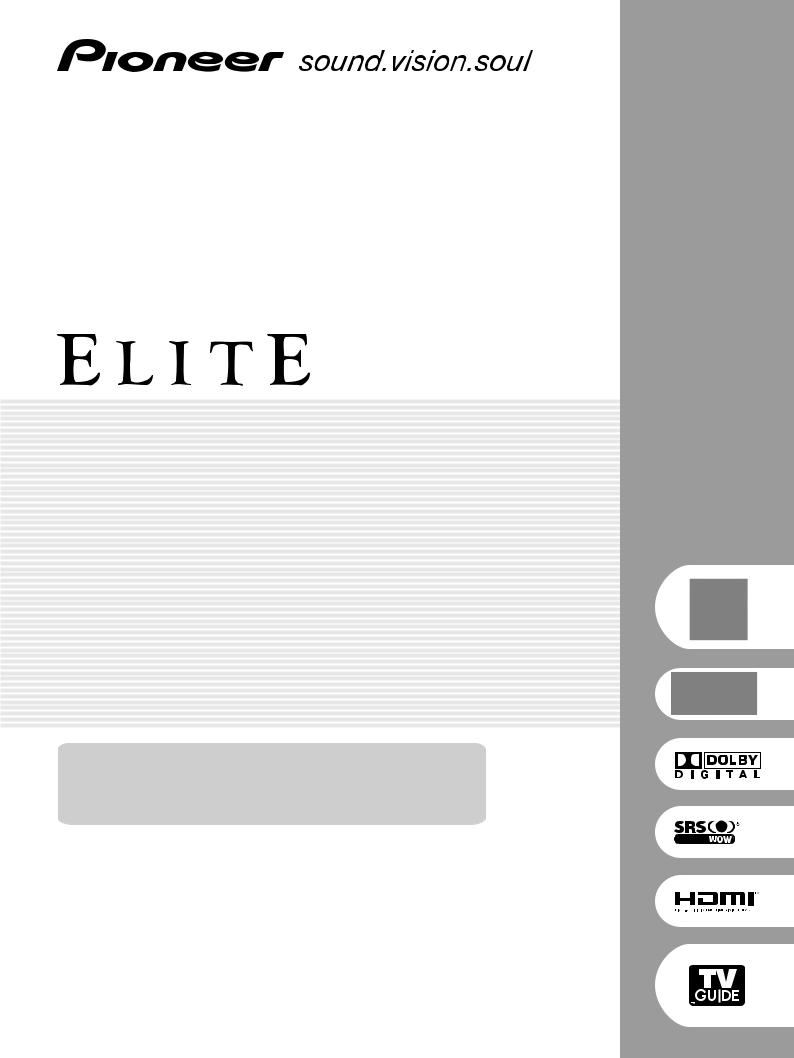
PLASMA DISPLAY SYSTEM
PRO-1540HD PRO-1140HD PRO-940HD
Register Your Product on
www.pioneerelectronics.com (US) www.pioneerelectronics.ca (Canada)
Operating Instructions
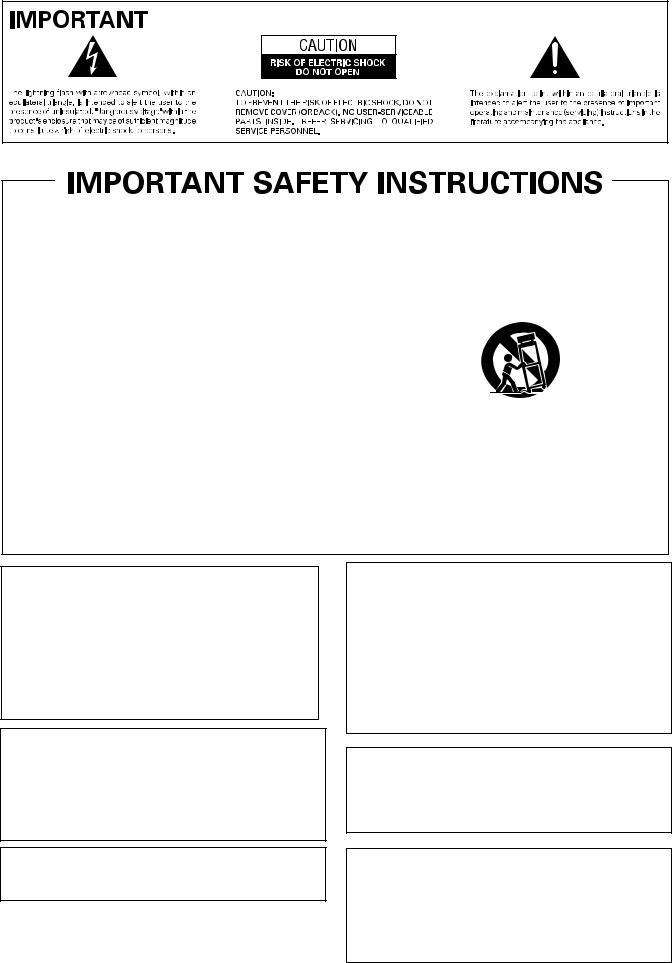
1)Read these instructions.
2)Keep these instructions.
3)Heed all warnings.
4)Follow all instructions.
5)Do not use this apparatus near water.
6)Clean only with dry cloth.
7)Do not block any ventilation openings. Install in accordance with the manufacturer’s instructions.
8)Do not install near any heat sources such as radiators, heat registers, stoves, or other apparatus (including amplifiers) that produce heat.
9)Do not defeat the safety purpose of the polarized or grounding-type plug. A polarized plug has two blades with one wider than the other. A grounding type plug has two blades and a third grounding prong. The wide blade or the third prong are provided for your safety. If the provided plug does not fit into your outlet, consult an electrician for replacement of the obsolete outlet.
10)Protect the power cord from being walked on or pinched particularly at plugs, convenience receptacles, and the point where they exit from the apparatus.
11)Only use attachments/accessories specified by the manufacturer.
12)Use only with the cart, stand, tripod, bracket, or table specified by the manufacturer, or sold with the apparatus. When a cart is used, use caution when moving the cart/apparatus combination to avoid injury from tip-over.
13)Unplug this apparatus during lightning storms or when unused for long periods of time.
14)Refer all servicing to qualified service personnel. Servicing is required when the apparatus has been damaged in any way, such as power-supply cord or plug is damaged, liquid has been spilled or objects have fallen into the apparatus, the apparatus has been exposed to rain or moisture, does not operate normally, or has been dropped.
NOTE TO CATV SYSTEM INSTALLER
THIS REMINDER IS PROVIDED TO CALL THE CATV SYSTEM INSTALLER’S ATTENTION TO ARTICLE 820-40 OF THE NEC THAT PROVIDES GUIDELINES FOR PROPER GROUNDING AND, IN PARTICULAR, SPECIFIES THAT THE CABLE GROUND SHALL BE CONNECTED TO THE GROUNDING SYSTEM OF THE BUILDING, AS CLOSE TO THE POINT OF CABLE ENTRY AS PRACTICAL.
WARNING: This product equipped with a threewire grounding (earthed) plug - a plug that has a third (grounding) pin. This plug only fits a grounding-type power outlet. If you are unable to insert the plug into an outlet, contact a licensed electrician to replace the outlet with a properly grounded one. Do not defeat the safety purpose of the grounding plug
WARNING: To prevent a fire hazard, do not place any naked flame sources (such as a lighted candle) on the equipment.
This digital television is capable of receiving analog basic, digital basic and digital premium cable television programming by direct connection to a cable system providing such programming. A security card provided by your cable operator is required to view encrypted digital programming. Certain advanced and interactive digital cable services such as video-on- demand, a cable operator’s enhanced program guide and data-enhanced television services may require the use of a set-top box. For more information call your local cable operator.
VENTILATION CAUTION:
When installing this unit, make sure to leave space around the unit for ventilation to improve heat radiation. For the minimum space required, see page 20.
WARNING: Slots and openings in the cabinet are provided for ventilation to ensure reliable operation of the product, and to protect it from overheating. To prevent fire hazard, the openings should never be blocked or covered with items (such as newspapers, table-cloths, curtains) or by operating the equipment on thick carpet or a bed.

WARNING: THE APPARATUS IS NOT WATERPROOFS, TO PREVENT FIRE OR SHOCK HAZARD, DO NOT EXPOSE THIS APPLIANCE TO RAIN OR MOISTURE AND DO NOT PUT ANY WATER SOURCE NEAR THIS APPARATUS, SUCH AS VASE, FLOWER POT, COSMETICS CONTAINER AND MEDICINE BOTTLE ETC.
WARNING: Handling the cord on this product or cords associated with accessories sold with the product will expose you to lead, a chemical known to the State of California and other governmental entities to cause cancer and birth defects or other reproductive harm. Wash hands after handling.
Information to User
Alteration or modifications carried out without appropriate authorization may invalidate the user’s right to operate the equipment.
[For Canadian model]
This Class B digital apparatus complies with Canadian ICES-003.
FEDERAL COMMUNICATIONS COMMISSION DECLARATION OF CONFORMITY
This device complies with part 15 of the FCC Rules. Operation is subject to the following two conditions: (1) This device may not cause harmful interference, and
(2) this device must accept any interference received, including interference that may cause undesired operation.
Product Name: Plasma Display System
Model Number: PRO-1540HD/PRO-1140HD/PRO-940HD
Product Category: Class B Personal Computers & Peripherals
Responsible Party Name: PIONEER ELECTRONICS SERVICE, INC.
Address: 1925 E. DOMINGUEZ ST. LONG BEACH, CA 90801-1760, U.S.A.
Phone: 800-421-1625
For Business Customer URL http://www.PioneerUSA.com
NOTE: This equipment has been tested and found to comply with the limits for a Class B digital device, pursuant to Part 15 of the FCC Rules. These limits are designed to provide reasonable protection against harmful interference in a residential installation.
This equipment generates, uses, and can radiate radio frequency energy and, if not installed and used in accordance with the instructions, may cause harmful interference to radio communications. However, there is no guarantee that interference will not occur in a particular installation. If this equipment does cause harmful interference to radio or television reception, which can be determined by turning the equipment off and on, the user is encouraged to try to correct the interference by one or more of the following measures:
–Reorient or relocate the receiving antenna.
–Increase the separation between the equipment and receiver.
–Connect the equipment into an outlet on a circuit different from that to which the receiver is connected.
– Consult the dealer or an experienced radio/TV technician for help. |
D8-10-1-2_En |
CAUTION: This product satisfies FCC regulations when shielded cables and connectors are used to connect the unit to other equipment. To prevent electromagnetic interference with electric appliances such as radios and televisions, use shielded cables and connectors for connections.
IMPORTANT NOTICE – THE SERIAL NUMBER FOR THIS EQUIPMENT IS LOCATED IN THE REAR.
PLEASE WRITE THIS SERIAL NUMBER ON YOUR ENCLOSED WARRANTY CARD AND KEEP IN A SECURE AREA. THIS IS FOR YOUR SECURITY.
CAUTION: The power switch does not completely separate the unit from the mains in off position. Therefore install the unit suitable places easy to disconnect the mains plug in case of the accident. The mains plug of unit should be unplugged from the wall socket when left unused for a long period of time.
STANDBY: |
When placed into the standby mode, the main power flow is cut and the unit is no longer |
|
fully operational. |
STANDBY/ON Indicator: The indicator is lit red when the unit is in the standby mode and lit blue when it is in the power-on mode. No operation can be performed when the indicator is off. However, the Plasma Display System will still consume some power as long as the power cord is inserted into the power outlet.
CAUTION:
Operating Environment
Operating environment temperature and humidity:
+0 ˚C to +40 ˚C (+32 ˚F to +104 ˚F), less than 85 %RH (cooling vents not blocked) Do not install this unit in a poorly ventilated area, or in locations exposed to high humidity or direct sunlight (or strong artificial light)
English

Contents
Thank you for buying this Pioneer product.
Please read through these operating instructions so you will know how to operate your model properly. After you have finished reading the instructions, put them away in a safe place for future reference.
In some countries or regions, the shape of the power plug and power outlet may sometimes differ from that shown in the explanatory drawings. However the method of connecting and operating the unit is the same.
Illustrations shown in this manual are for the PRO-1140HD unless otherwise specified.
01 Important User Guidance Information |
|
02 Safety Precautions |
|
03 Supplied Accessories |
|
04 Part Names |
|
Plasma Display ........................................... |
13 |
Remote control unit ................................... |
19 |
05 Preparation |
|
Installing the Plasma Display ................... |
20 |
Moving the Plasma Display ....................... |
20 |
Preventing the Plasma Display from |
|
Falling Over ................................................. |
21 |
Attaching/detaching the PIONEER stand |
|
(for PRO-940HD only) ................................ |
22 |
Cable connections for watching digital |
|
and/or conventional TV channels ............. |
23 |
Connecting VHF/UHF antennas and a |
|
Cable ....................................................... |
23 |
Inserting the CableCARD™ ....................... |
23 |
Switching between antenna A and B ....... |
23 |
Preparing the remote control unit ............ |
24 |
Inserting batteries ................................. |
24 |
Cautions regarding batteries ................ |
24 |
Allowed operation range of the remote |
|
control unit ............................................. |
24 |
Cautions regarding the remote control |
|
unit .......................................................... |
24 |
Connecting the power cord ....................... |
25 |
Routing cables ........................................... |
25 |
06 Basic Operations |
|
Turning on the power ................................. |
26 |
Turning off the power ................................. |
26 |
Watching TV channels ............................... |
27 |
Selecting the antenna ........................... |
27 |
Changing channels ............................... |
27 |
Changing the volume and sound ......... |
28 |
Changing the language ........................ |
28 |
Setting MTS/SAP mode ........................ |
29 |
Viewing a channel banner .................... |
30 |
4
En
Using the POD service ......................... |
30 |
Using the multiscreen functions ............. |
30 |
Splitting the screen .............................. |
30 |
Freezing images .................................... |
31 |
07 TV Guide On Screen™ System Setup |
|
About the TV Guide On Screen™ |
|
system ........................................................ |
32 |
Setting up the TV Guide On Screen™ |
|
system ........................................................ |
32 |
08 Menu Setup |
|
Menu Configuration .................................. |
36 |
AV mode menus ................................... |
36 |
PC mode menus ................................... |
36 |
Menu operations ................................... |
36 |
09 Tuner Setup |
|
Setting up TV channels ............................. |
37 |
Using Auto Channel Preset ................. |
37 |
Setting for skipping unwanted |
|
channels ................................................ |
37 |
Setting up TV channels manually ....... |
37 |
Checking signal strength ..................... |
37 |
Checking the CableCARD ID ............... |
38 |
Parental Control ........................................ |
38 |
Changing the password ....................... |
38 |
Clearing the password ......................... |
39 |
Activating the Parental Control ........... |
39 |
Setting the voluntary movie rating |
|
system (MPAA) ..................................... |
39 |
Setting the TV ratings ........................... |
39 |
Setting the TV Parental Guidelines |
|
(TV Guidelines) ...................................... |
40 |
Blocking Not Rated TV programs ........ |
40 |
Canadian rating systems ..................... |
40 |
Setting Canadian English ratings ....... |
41 |
Setting Canadian French ratings ........ |
41 |
Setting new ratings .............................. |
41 |
Deleting new ratings ............................ |
42 |
Temporarily deactivating the Parental |
|
Control ................................................... |
42 |
Setting your favorite channels ................. |
43 |

Contents |
|
Setting up closed captions ....................... |
43 |
Activating the closed caption .............. |
43 |
Selecting the type of conventional |
|
closed captions ..................................... |
43 |
Selecting digital closed captions ........ |
44 |
Selecting digital closed caption |
|
parameters ............................................ |
44 |
Clock Setting ............................................. |
44 |
10 TV Guide On Screen™ System Operation |
|
Using the TV Guide On Screen™ |
|
system ........................................................ |
46 |
Screen components .................................. |
46 |
TV Guide On Screen™ icons ................ |
46 |
TV Guide On Screen™ navigation ....... |
47 |
The Listings screen ................................... |
47 |
Recording programs ................................. |
48 |
Setting program reminders ...................... |
49 |
Searching for programs ........................... |
51 |
Searching by category .......................... |
51 |
Searching by keyword .......................... |
52 |
Alphabetical search ............................. |
53 |
The search Episode Options menu ..... |
53 |
Scheduling recordings and reminders ... 54 |
|
The Schedule Options menu ............... |
54 |
Changing setup options ........................... |
55 |
Changing the System Settings ............ |
55 |
Changing the Channel Display |
|
settings .................................................. |
55 |
Changing the Default Options ............. |
56 |
11 Adjustments and Settings |
|
Sleep Timer ................................................ |
57 |
AV Selection .............................................. |
57 |
Basic picture adjustments ....................... |
58 |
Advanced picture adjustments ................ |
59 |
Using PureCinema ............................... |
59 |
Using Color Temp ................................. |
59 |
Using CTI ............................................... |
60 |
Using Color Management .................... |
60 |
Using Color Space ................................ |
60 |
Using Intelligent Color ......................... |
60 |
Eliminating noise from images ........... |
61 |
Using the Dynamic Range Expander |
|
(DRE) functions .................................... |
61 |
Using the 3DYC and I-P Mode ............. |
62 |
Sound adjustments ................................... |
62 |
FOCUS ................................................... |
63 |
Front Surround ..................................... |
63 |
Power Control ............................................ |
63 |
Energy Save ........................................... |
63 |
No Signal off (AV mode only) ............... |
63 |
No Operation off (AV mode only) ......... |
64 |
Power Management |
|
(PC mode only) ...................................... |
64 |
Image position adjustment |
|
(AV mode only) .......................................... |
64 |
Automatic image position and clock |
|
(Hertz) adjustments (PC mode only) ....... |
64 |
Manual image position and clock |
|
adjustments (PC mode only) .................... |
65 |
Selecting a screen size manually ............. |
65 |
Selecting a screen size automatically ..... 66 |
|
Selecting a screen size for 4:3 aspect |
|
ratio signals ........................................... |
66 |
Changing the brightness on both sides of |
|
the screen (Side Mask) ............................. |
67 |
Language setting ....................................... |
67 |
12 Using External Equipment |
|
About External Equipment ....................... |
68 |
Watching a DVD image ............................ |
68 |
Connecting a DVD player ..................... |
68 |
Displaying a DVD image ...................... |
68 |
Watching a VCR image ............................. |
68 |
Connecting a VCR ................................. |
68 |
Displaying a VCR image ....................... |
68 |
Using HDMI Input ..................................... |
69 |
Connecting HDMI equipment ............. |
69 |
Using a game console or watching |
|
camcorder images .................................... |
70 |
Connecting a game console or |
|
camcorder ............................................. |
70 |
Displaying an image of the game |
|
console or camcorder .......................... |
70 |
Recording digital TV programs using |
|
a VCR .......................................................... |
70 |
Avoiding unwanted feedback .............. |
70 |
Connecting a recorder ......................... |
71 |
Connecting other audio equipment ......... |
71 |
Connecting an AV receiver .................. |
71 |
Watching an image from a computer ..... 72 |
|
Connecting a personal computer ........ |
72 |
Displaying an image from a PC ........... |
72 |
Computer compatibility chart .................. |
73 |
G-LINK™ connection ................................. |
73 |
Connecting control cables ....................... |
74 |
About SR+ ............................................ |
74 |
English
5
En

Contents |
|
Enjoying the Home Media Gallery ............ |
75 |
Making network connections ............... |
76 |
Connecting a USB device ..................... |
76 |
Starting the Home Media Gallery |
|
function .................................................. |
77 |
Enjoying movie files .............................. |
79 |
Enjoying music files .............................. |
82 |
Enjoying photo files ............................... |
83 |
Other useful functions .......................... |
86 |
Glossary .................................................. |
91 |
13 Useful Remote Control Features |
|
Learning function of the remote |
|
control unit ................................................. |
92 |
Using the learning function ................. |
92 |
Presetting manufacturer codes to |
|
control other devices ................................. |
92 |
Presetting manufacturer codes ........... |
92 |
Library Search ........................................ |
92 |
Delete Learning ..................................... |
92 |
Manufacturing Reset ............................ |
93 |
Programming codes ............................ |
94 |
CABLE .................................................... |
94 |
SATELLITE .............................................. |
94 |
VCR ......................................................... |
95 |
PVR ......................................................... |
97 |
DVD ......................................................... |
97 |
DVD-R ..................................................... |
98 |
LD ............................................................ |
98 |
Using the remote control unit to control |
|
other devices .............................................. |
99 |
Receiver control buttons ....................... |
99 |
CBL/SAT control buttons .................... |
100 |
VCR control buttons ............................ |
101 |
DVD/DVR control buttons ................... |
102 |
14 Appendix |
|
Troubleshooting ....................................... |
103 |
Specifications ........................................... |
117 |
6
En

Important User Guidance Information |
01 |
In order to obtain maximum enjoyment from this Pioneer PureVision PRO-1540HD/PRO-1140HD/PRO-940HD Plasma Display Panel, please first read this information carefully.
With the Pioneer PureVision PRO-1540HD/PRO-1140HD/PRO- 940HD, you can be assured of a high quality Plasma Display Panel with long-life and high reliability. To achieve images of exceptional quality, this Pioneer Plasma Display Panel incorporates state-of-the-art design and construction as well as precise and highly advanced technology.
The Pioneer PureVision PRO-1540HD/PRO-1140HD/PRO- 940HD incorporates the latest in color filter technology – Direct Color Filter. This filter technology improves color reproduction over previous models. It also eliminates the need for a glass panel to be layered in front of the plasma panel. This feature which furthers Pioneer’s goal of reducing environmental waste in consumer electronics, during the manufacturing process and in the future during the recycling process.
Over the course of its lifetime, the luminosity of the Pioneer PRO-1540HD/PRO-1140HD/PRO-940HD Plasma Display System will diminish very slowly, which happens to all phosphor-based screens (for example, a traditional tube-type television). To enjoy beautiful and bright images on your Pioneer Plasma Display Panel for many years to come, please carefully read and follow the usage guidelines below.
Usage guidelines
All phosphor-based screens (including conventional tube-type televisions) can be affected by static images appearing for a prolonged period. Plasma displays are no exception to this rule. After-image and permanent effects on the screen can be avoided by taking some basic precautions.
•Whenever possible, avoid showing the same image or lowmotion pictures (e.g. closed-captioned images or video game images which have static portions).
•Avoid viewing the On Screen Display (OSD) for extended periods (from a DVD player, VCR, and all other components).
•Do not leave the same picture, freeze-framed or paused continuously, shown over a long period of time when using the still picture mode from a TV, VCR, DVD player or any other component.
•Images which have both very bright areas and very dark areas side by side should not be displayed for a prolonged period of time.
•When playing a video game, the “GAME” mode setting within “AV Selection” is strongly recommended. However, please do not use this mode for long periods of time.
•After playing a game, displaying a PC image, or any still image, it is best to view a normal moving picture in the “WIDE” or “FULL” screen setting for over 3 times longer than the previous still/moving image was shown.
•After using the Plasma Display System, always switch the display to Standby.
•Extensive viewing of content with top, bottom, or side masks may cause uneven wear. After viewing masked content, view full screen motion video for an equal or greater amount of time.
Installation guidelines
The Pioneer PureVision PRO-1540HD/PRO-1140HD/PRO- 940HD Plasma Display Panel incorporates a very thin design. To ensure safety, please take the proper measures when mounting or installing the Plasma Display. Prevent the unit from tipping over during vibration or accidental movement.
This product should be installed by using only parts and accessories designed by PIONEER. Use of installation or mounting accessories other than PIONEER-approved stands or brackets may result in instability and could cause injury. For custom installation, please consult the dealer where the unit was purchased. To ensure correct installation, experienced and qualified experts must install the unit. PIONEER is not responsible for accident or damage caused by the use of parts and/or accessories manufactured by other unauthorized companies.
To avoid malfunction and overheating when installing, make sure that the vents on the main unit are not blocked. To ensure proper venting:
•Distance the unit slightly from other equipment, walls, etc. For the minimum space required around the unit, see page 20.
•Do not place the unit inside a narrow place where ventilation is poor.
•Do not cover with a cloth, etc.
•Clean the vents on the sides and rear of the unit to remove dust build-up. Use a vacuum cleaner set to its lowest suction setting to clear dust.
•Do not place the product on a carpet or blanket.
•Do not leave the product tilted at an angle without proper anchoring.
•Do not invert the product.
Using the unit without proper ventilation may cause the internal temperature to rise, and could result in possible malfunction. When the surrounding or internal temperature exceeds a certain degree, the display automatically powers OFF in order to cool the internal electronics.
Malfunction can be caused by many factors: inappropriate installation site, improper assembly/installation/mounting, improper operation of or modifications made to this product, etc. PIONEER is not responsible for accidents or malfunction caused by the above situations.
NOTE
The following points are typical effects and characteristics of a phosphor-based matrix display and as such, are not covered by the manufacturer’s limited warranties:
•Permanent residual images upon the panel’s phosphors.
•Existence of a small number of inactive light cells.
•Panel generated sounds (Fan motor noise, electrical circuit humming, glass panel buzzing, etc.)
English
7
En

01 Important User Guidance Information
CAUTION
PIONEER bears no responsibility for any damage arising from incorrect use of the product malfunctions when in use, other product related problems, and use of the product except in cases where the company must be liable.
Plasma Display protection function
When still images (such as photos and computer images) stay on the screen for an extended period of time, the screen slightly dims. This function automatically adjusts the brightness to protect the screen when a still image is detected. The screen is dimmed for approximately three minutes.
Information of pixel defect
Plasma screens display information using pixels. Pioneer plasma display panels contain a very large number of pixels. (A 42" panel has over 2.3 million pixels, a 50" panel has over 3.1 million pixels and a 60" panel over 3.1 million pixels). All Pioneer plasma panels are manufactured using a very high level of ultra-precision technology and undergo individual quality control.
In rare cases, one or more pixels may remain switched Off or On. A pixel that remains Off appears as a tiny black dot on the screen while an active pixel appears as a dot of a particular color.
This effect is common to all plasma displays because it is a consequence of the technology.
If the defective pixels are visible at a normal viewing distance of between 2.5 and 3.5 meters (8.2 and 11.5 feet) while viewing a normal broadcast (i.e. not a test card, still image, or single color display) please contact Pioneer Customer Support Div. (USA) or Customer Satisfaction Dept. (CANADA). See back cover for contact information.
If, however, the fixed pixel(s) can only be seen from a distance of less than 8 feet or during single color displays then the appearance is considered normal for plasma technology.
Infrared rays
The Plasma Display releases infrared rays because of the panel characteristics. Surrounding equipment with remote controls and wireless headphones using infrared signals can experience interference. Move any affected equipment to a location away from the plasma panel.
Radio interference
While this product meets required specifications, the panel emits a small amount of electronic noise. This noise can affect radio, computer, and VCR reception. Move devices away from the panel to reduce or eliminate interference.
Plasma Display driving sound
The screen of the Plasma Display is composed of extremely fine pixels and these pixels emit light according to received video signals. This principle may cause you to hear a buzz or electrical hum coming from the Plasma Display.
Do not attach such items as labels and tape to the product.
• Labels and tape can mar or discolor the cabinet.
8
When not using the product for a long time
•If you do not use the product for a long time, the functions of the product may be adversely affected. Switch ON and run the product occasionally to maintain quality.
Condensation
•Condensation may take place on the surface or inside of the panel when the unit is rapidly moved from a cold place to a warm place or when a heater is turned On in the room. When condensation occurs, do not switch On the panel until condensation disappears. Operating the panel when there is condensation can damage the unit.
Cleaning the surface of the screen and the glossy surface of the front cabinet
•When cleaning the surface of the screen or the glossy surface of the front cabinet, gently wipe with the supplied cleaning cloth or a similar cloth (e.g., cotton, flannel, etc.). Using a dirty or course material cloth can scratch and damage the panel’s surfaces.
•If you clean the surface of the screen with a wet cloth, water droplets may enter into the product, resulting in a malfunction.
Cleaning the cabinet
•When cleaning other panel surfaces, gently wipe with a clean soft cloth (e.g., cotton, flannel, etc.). Using a dirty or course material cloth can scratch and damage the panel’s surfaces.
•The cabinet of this product is mostly composed of plastic. Do not use chemicals such as benzene or thinner to clean the cabinet. Using these chemicals can strip the surface coating or cause cabinet deterioration.
•Do not expose the product to a volatile gas or fluid such as pesticide. Do not apply rubber or vinyl products to the cabinet for long periods of time. The effect of plasticizer on the cabinet can strip the surface coating or cause deterioration.
•If you clean the surface of the cabinet with a wet cloth, water droplets may enter into the product, resulting in a malfunction.
Handles at the rear of the Plasma Display
•Do not remove the handles from the rear of the Plasma Display.
•When moving the Plasma Display, ask another person for help and use the handles attached to the rear of the Plasma Display. Do not move the Plasma Display by holding only a single handle. Use the handles as shown on page 20.
•Do not use the handles to hang, suspend, or anchor the panel.
Fan motor noise
The rotation speed of the cooling fan motor increases when the ambient temperature of the Plasma Display becomes high. You may hear the sound of the fan motor at that time.
En
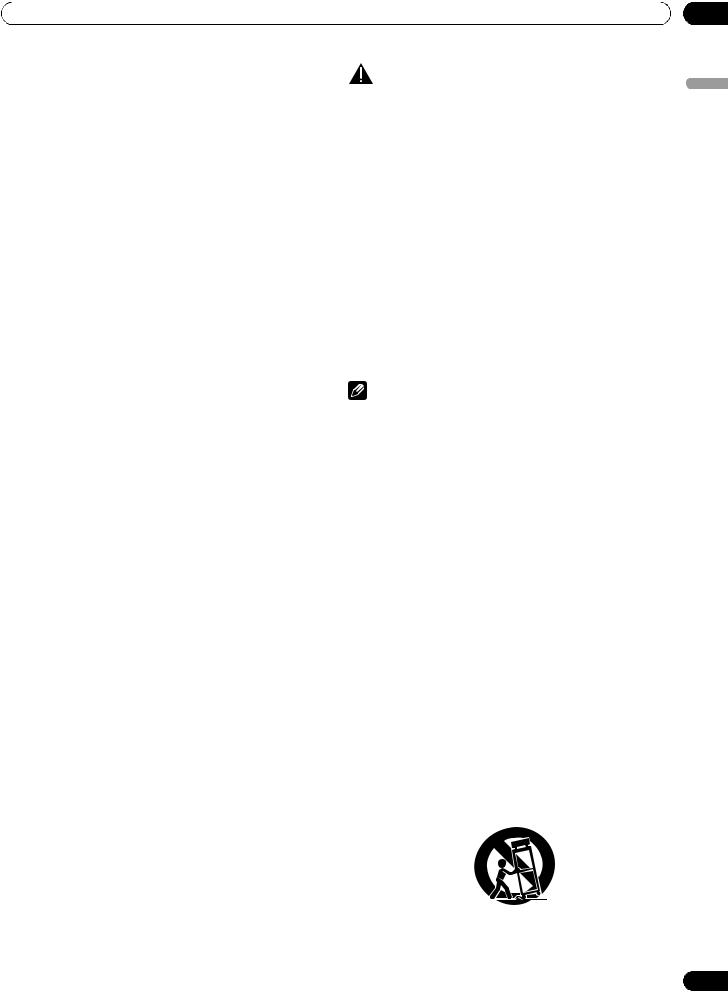
Important User Guidance Information |
01 |
About the menu window size following video format switch
The video program that you watch may be high definition (HD) or standard definition (SD). This Plasma Display is designed to scale to either HD or SD signals. If the video program’s definition type changes while a menu window is displayed on the screen (for example: HD → SD or SD → HD), the menu size may temporarily shrink or enlarge until the scaling is complete. For example, switching between a TV program and an external digital video recorder (D-VHS) while viewing a menu can cause the menu window size to fluctuate.
If this happens, the menu will return to its normal size after two to three seconds. This action is normal, and does not indicate a problem with your Plasma Display Panel.
Image Retention
When a static image is shown on a display for several hours, a faint imprint of the image, known as image retention, can remain. This image retention may be temporary or permanent. Although caused by different things, image retention can occur on all display technologies, including plasma and LCD. On today’s plasma displays, permanent image retention is less of a worry. Most image retention can be improved simply by watching a motion video sequence.
Image retention, also known as burn-in, can occur in all phosphor-based display systems (including CRT television systems–both direct view and projection–as well as plasma display systems). To avoid image retention or burn-in, do not show a still image for an extended period. Recommended guidelines are as follows:
•Do not display static images such as still images, fixed images from PC or TV game equipment, and/or fixed images such as time of day indicator or channel logo display for long periods.
•Do not display content in the 4:3 aspect ratio (black or gray bars on left and right side of content) or letter-box content (black bars above and below content) for extended periods of time, or use either of these viewing modes repeatedly within a short period of time. This plasma display system is equipped with multiple wide-screen viewing modes; use one of these screen modes to fill the entire screen with content.
•Displaying dark images after showing a still image for an extended time may cause image retention. In most cases, the image retention can be corrected by displaying bright images for a similar period of time.
Warning: Displaying a still image on the panel for a long period of time can cause the image to be burned in to the screen permanently.
CAUTION
Panel sticking and after-image lag
•Displaying the same images such as still images for a long time may cause after-image lagging. This may occur in the following two cases.
1After-image lagging due to remaining electric load
When image patterns with very high peak luminance are displayed for more than one(1) minute, after-image lagging may occur due to the remaining electrical load. The afterimages remaining on the screen disappears when moving images are shown. The time for the after-images to disappear depends on the luminance of the still image and the length of time displayed.
2After-image (lag image) due to burning
Avoid displaying the same image on the Plasma Display continuously over a long period of time. If the same image is displayed continuously for several hours, or for shorter periods but over several days, a permanent after-image may remain on the screen due to burning of the fluorescent materials. Such images may become less noticeable if moving images are later displayed but they do not disappear completely.
NOTE
•When a program menu, TV Guide screen or frozen image is displayed for 5 to 10 minutes, the system automatically turns the screen off to prevent damage from screen burning.
•To prevent screen burning, the display position is automatically changed slightly when the power is switched on or the input changed. Depending on the broadcast content, some parts of the picture may not be visible.
Preventing damage from screen burning
•Please show images in full screen unless doing so causes copyright infringement. See page 65.
•The Energy save function can be set to help prevent screen burn-in. See page 63.
 CAUTION
CAUTION
DO NOT PLACE THIS PRODUCT ON AN UNSTABLE CART, STAND, TRIPOD, BRACKET, OR TABLE. THE PRODUCT MAY FALL, CAUSING SERIOUS PERSONAL INJURY AND SERIOUS DAMAGE TO THE PRODUCT. USE ONLY WITH A CART, STAND, TRIPOD, BRACKET, OR TABLE RECOMMENDED BY THE MANUFACTURER, OR SOLD WITH THE PRODUCT. FOLLOW THE MANUFACTURER’S INSTRUCTIONS WHEN INSTALLING THE PRODUCT. ONLY USE MOUNTING ACCESSORIES RECOMMENDED BY THE MANUFACTURER.
A PRODUCT AND CART COMBINATION SHOULD BE MOVED WITH CARE. QUICK STOPS, EXCESSIVE FORCE, AND UNEVEN SURFACES MAY CAUSE THE COMBINED UNIT TO OVERTURN.
English
9
En
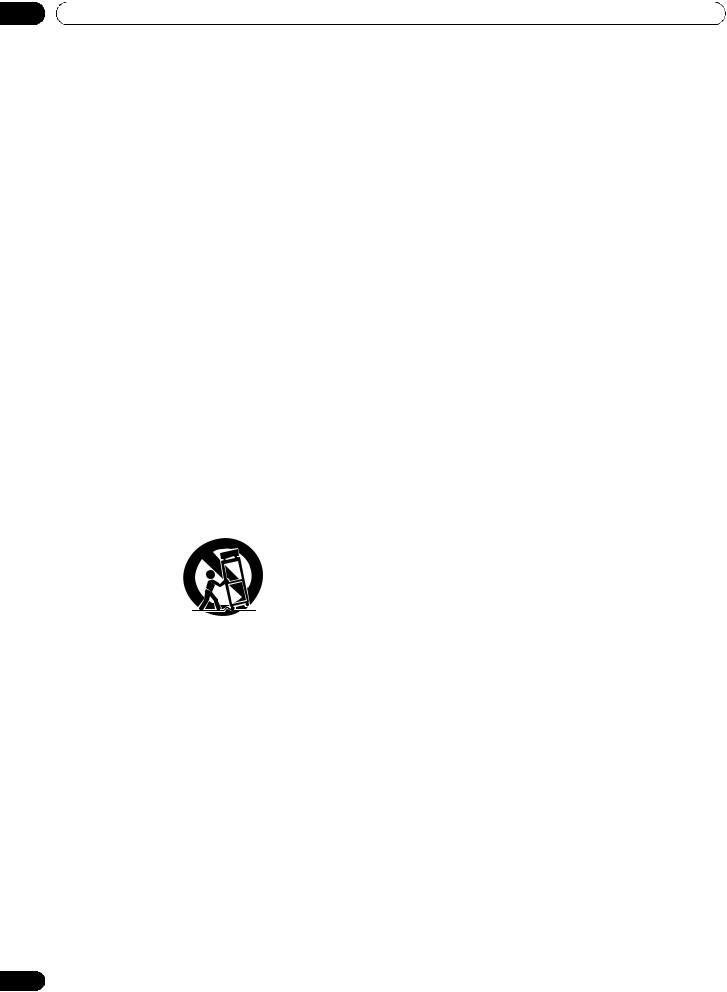
02 Safety Precautions
This product has been engineered and manufactured with the highest priority on safety. However, improper use can result in electric shock and/or fire. To prevent injury, please observe the following instructions when installing, operating and cleaning the product. To ensure your safety and prolong the service life of your product, please read the following precautions carefully before using the product.
•Read all operating instructions before operating the panel.
•Keep this manual safe for future reference.
•Observe all warnings on the product and in the operating instructions.
•Follow all operating instructions.
•Cleaning—Unplug the power cord from the wall outlet before cleaning the product. To clean the product, use the supplied cleaning cloth or other soft cloth (e.g., cotton, flannel, etc.). Do not use liquid or aerosol cleaners.
•Do not use attachments unless recommended by the manufacturer. Use of unauthorized attachments can result in accidents.
•Do not use the product near water (bathtub, washbasin, kitchen sink, laundry area, swimming pool, in a wet or damp basement, etc.).
•Do not place the product on an unstable cart, stand, tripod or table. Placing the product on an unstable base can cause the product to fall, resulting in serious personal injuries as well as damage to the panel. Use only a cart, stand, tripod, bracket or table recommended by the manufacturer or sold with the unit. When mounting the product on a wall, follow the manufacturer’s instructions precisely. Use only mounting hardware recommended by the manufacturer.
•Sudden stops, excessive pushing and uneven floors can cause a unit mounted on a cart to fall. Move the cart with caution.
• Openings in the cabinet are designed for ventilation. Do not cover or block these vents and openings since insufficient ventilation can cause overheating and/or shorten the life of the panel. Do not place the product on a bed, sofa, rug or other similar surface since material can block the vents. This product is not designed for built-in installations. Do not place the product in an enclosed place such as a bookcase or rack unless properly vented.
• This product must operate on a power source as stated on the specification label. If you are not sure of the type of power supply used in your home, consult your dealer or local power company.
• Power cord protection—The power cords must be routed properly to prevent being stepped on or being pinched between objects. Check entire length of all cables to guard against pinching.
• This panel contains glass elements. Sudden impacts from dropping or hitting the panel can break the glass. If the panel is broken, avoid contact with the glass shards.
• Do not overload AC outlets or extension cords. Overloading can cause fire or electric shock.
• Never insert objects through vents or openings. High voltage flows in the product, inserting an object can cause electrical shock and/or short internal parts. For the same reason, do
not spill water or liquids into the products.
10
•Do not attempt to service the product yourself. Removing covers can expose you to high voltage and other dangerous conditions. Request service from qualified and authorized service personnel.
•If any of the following conditions occurs, unplug the power cord from the AC outlet and arrange for repairs with qualified service personnel.
•power cord or plug is damaged
•liquid spilled or objects fallen into unit
•exposed to rain or water
•product fails to perform as described in the operating instructions
Do not touch the controls other than those described in the operating instructions. Improper adjustments can cause damage, which often requires correction by a qualified technician
•unit dropped or damaged
•abnormal appearance of picture
•Replacement parts must meet or exceed specifications set by the manufacturer. Use of unauthorized parts can result in fire, electric shock and/or other danger.
•Upon completion of service or repair work, request that the service technician perform periodic safety checks to ensure that the product is in proper operating condition.
•When mounting the product on a wall or ceiling, install the panel according to the method recommended by the manufacturer.
•Keep the product away from heat sources such as radiators, heaters, stoves and other heat-generating devices (including amplifiers).
•Unplug the power cord from the wall outlet before installing the speakers.
•Never expose the screen of the Plasma Display Panel to a strong impact. The screen may be broken, resulting in fire or personal injury.
•Do not expose the Plasma Display Panel to direct sunlight for a long period of time. The optical characteristics of the front protection panel changes, resulting in discoloration or warping.
•The approximate weight of each Plasma Display Panel is as follows:
-PRO-1540HD - 51.5 kg (113.6 lbs.)
-PRO-1140HD - 34.3 kg (75.7 lbs.)
-PRO-940HD - 31.7 kg (69.9 lbs.) (with stand)
Unpacking, carrying, and installing requires two or more people.
En
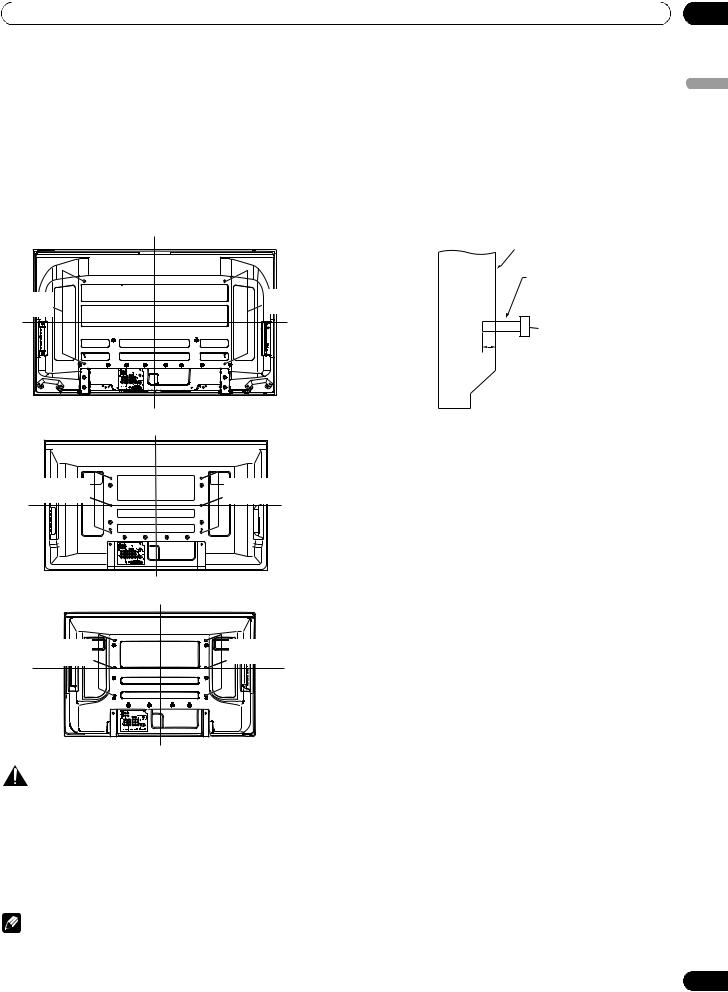
Safety Precautions
Installation Precautions
Observe the following precautions when installing the panel using optional mounting methods such as the bracket.
When using the optional brackets or equivalent items
•Ask your dealer to perform the installation.
•Use only the supplied bolts.
•For details, see the instruction manual that comes with the optional bracket (or equivalent mounting item).
When using other items
•Consult your dealer.
•The following four to six mounting holes can be used for the installation:
Rear view (PRO-1540HD)
Mounting hole
Median line
Rear view (PRO-1140HD)
Mounting hole
|
Side view |
Mounting surface |
|
|
|
||
|
|
Mounting |
|
Mounting |
Plasma |
bracket (or |
|
hole |
equivalent item) |
||
Display |
|||
Median line |
|
||
|
M8 screw |
||
|
|
||
|
|
12 mm to 18 mm |
|
|
|
(0.5 inches to 0.7 inches) |
Mounting
hole
Median line
Median line
Rear view (PRO-940HD)
Mounting |
Mounting |
hole |
hole |
Median line
Median line
CAUTION
•Use at least four mounting holes symmetrical to the vertical and horizontal median lines.
•Use M8 screws, which go 12 mm to 18 mm (0.5 inches to 0.7 inches) in depth from the mounting surface of the Plasma Display. See the side view above.
•Be careful not to block rear vents on the Plasma Display.
•Install the Plasma Display on a flat surface to avoid warping the glass.
•The diagrams above show the location of standard mounting screw holes. Holes other than those shown above are for specific mounting methods and should not be used unless a mounting option’s instructions require their use.
NOTE
•Use the optional PIONEER mounting products whenever possible.
•PIONEER shall not be liable for any personal injury or property damage that results from using mounting items other than the optional PIONEER products.
02
English
11
En
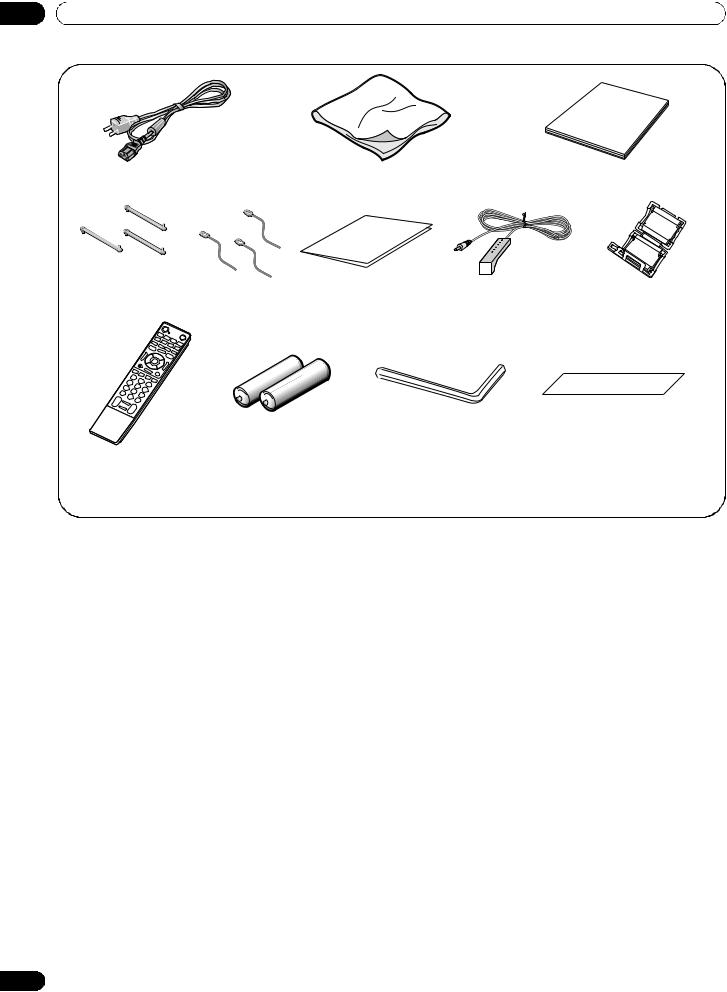
03 |
Supplied Accessories |
Power cord (2 m/6.6 feet) |
Cleaning cloth |
|
Operating instructions |
|
|
|
|
|
|
|
|
|
|
|
|
|
|
|
|
|
|
|
|
|
Speed clamp × 3 |
Bead band × 3 |
Warranty card |
G-LINK cable (3 m/9.8 feet) |
Ferrite core |
|
AA size battery x 2 |
|
(Alkaline battery for |
Remote control unit |
remote control unit) |
Hexagonal wrench x 1 |
Terminal position sheet |
(Diagonal size: 6 mm) |
(for use when mounting |
(for PRO-940HD only) |
the Plasma Display on the wall) |
|
(for PRO-1540HD only) |
12
En
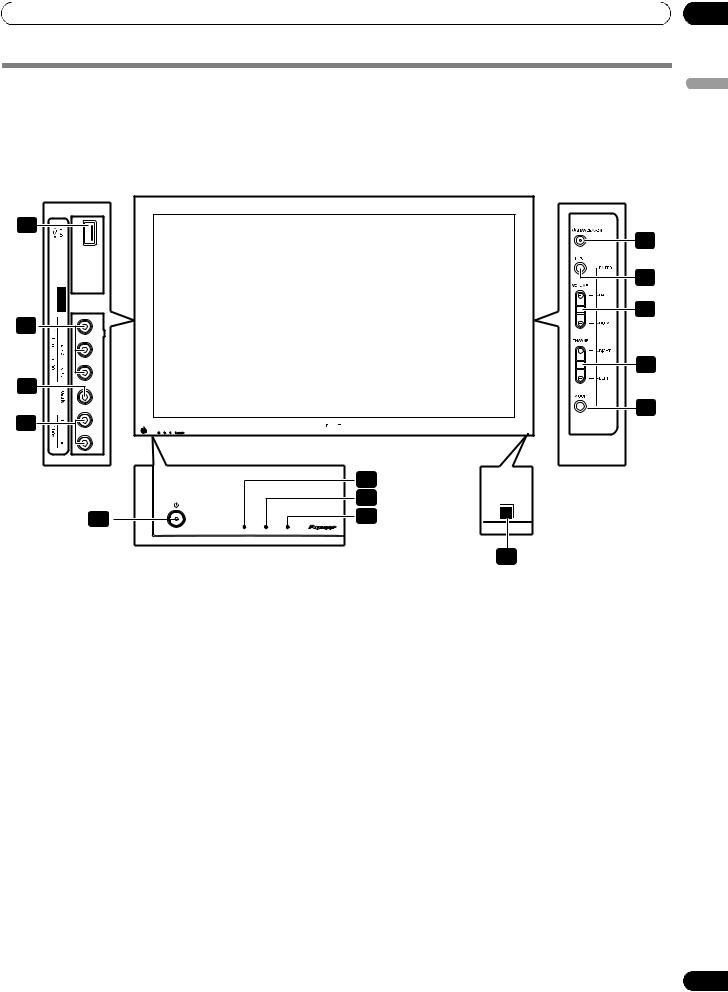
Part Names
Plasma Display
Front/side view (PRO-1540HD)
11
12
13
14
1
1a POWER button (See page 26)
2POWER ON indicator (See page 26)
3STANDBY indicator (See page 26)
4REC TIMER indicator
5Remote control sensor
04
English
6
7
8
9
10
2
3
4
5
(Side view)
6STANDBY/ON button
7INPUT button (ENTER button*)
8VOLUME UP/DOWN buttons (UP/DOWN buttons*)
9CHANNEL UP/DOWN buttons (LEFT/ RIGHT buttons*)
10TV GUIDE button*
11USB port
12INPUT 4 terminals (COMPONENT VIDEO: Y, CB/PB, CR/PR)
13INPUT 4 terminal (VIDEO)
14INPUT 4 terminals (AUDIO)
* ability to operate the TV Guide On Screen™ system.
13
En
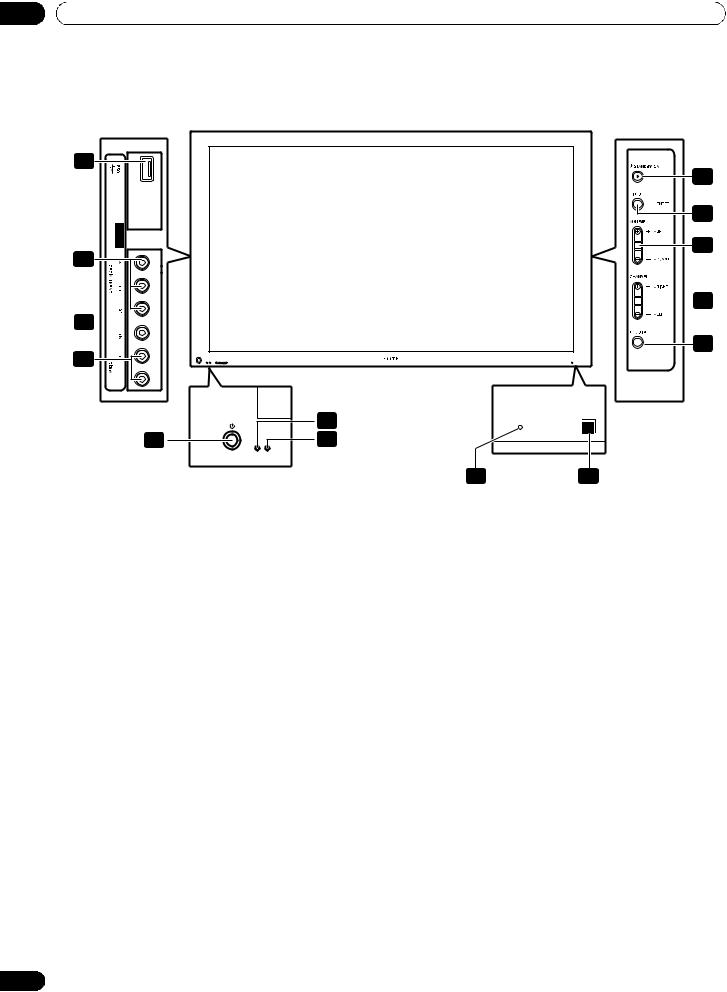
04 Part Names
Front/side view (PRO-1140HD)
11
6
7
8
12


 9 13
9 13
10
14
|
2 |
|
1 |
3 |
|
|
4 |
5 |
|
|
(Side view) |
|
1 |
a POWER button |
6 |
STANDBY/ON button |
|
(See page 26) |
7 |
INPUT button (ENTER button*) |
2 |
POWER ON indicator |
8 |
VOLUME UP/DOWN buttons (UP/DOWN |
|
(See page 26) |
|
buttons*) |
3 |
STANDBY indicator |
9 |
CHANNEL UP/DOWN buttons (LEFT/ |
|
(See page 26) |
|
RIGHT buttons*) |
4 |
REC TIMER indicator |
10 |
TV GUIDE button* |
5 |
Remote control sensor |
11 |
USB port |
|
|
12 |
INPUT 4 terminals (COMPONENT VIDEO: Y, |
|
|
|
CB/PB, CR/PR) |
|
|
13 |
INPUT 4 terminal (VIDEO) |
|
|
14 |
INPUT 4 terminals (AUDIO) |
* ability to operate the TV Guide On Screen™ system.
14
En
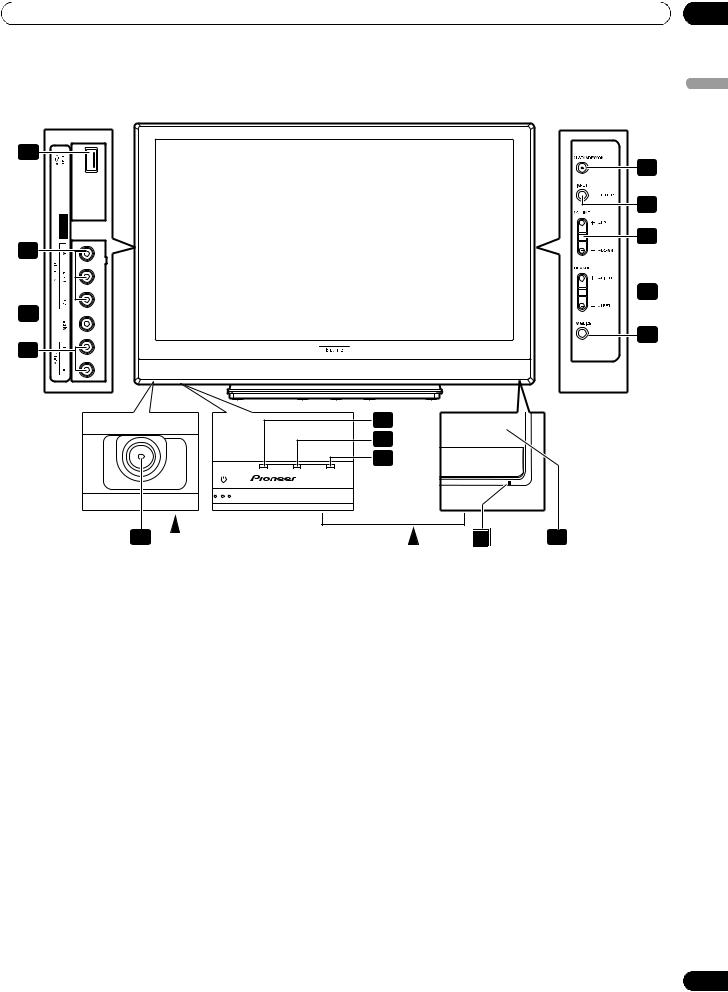
Part Names |
04 |
Front/side view (PRO-940HD)
English
11
6
7
8
12


 9 13
9 13
10
14
2
3
4
|
1 |
|
|
|
|
|
|
5 |
|
|
|
|
|
|
|||||
|
Viewed from |
|
below of the display |
|
Viewed |
|
from the front side of the display |
||
|
|
|
|
||||||
1 |
a POWER button |
(Side view) |
|||||||
|
(See page 26) |
6 |
STANDBY/ON button |
||||||
2 |
POWER ON indicator |
7 |
INPUT button (ENTER button*) |
||||||
|
(See page 26) |
8 |
VOLUME UP/DOWN buttons (UP/DOWN |
||||||
3 |
STANDBY indicator |
|
buttons*) |
||||||
|
(See page 26) |
9 |
CHANNEL UP/DOWN buttons (LEFT/ |
||||||
4 |
REC TIMER indicator |
|
RIGHT buttons*) |
||||||
5 |
Remote control sensor |
10 |
TV GUIDE button* |
||||||
|
|
|
|
|
11 |
USB port |
|||
|
|
|
|
|
12 |
INPUT 4 terminals (COMPONENT VIDEO: Y, |
|||
|
|
|
|
|
|
CB/PB, CR/PR) |
|||
|
|
|
|
|
13 |
INPUT 4 terminal (VIDEO) |
|||
|
|
|
|
|
14 |
INPUT 4 terminals (AUDIO) |
|||
* ability to operate the TV Guide On Screen™ system.
15
En
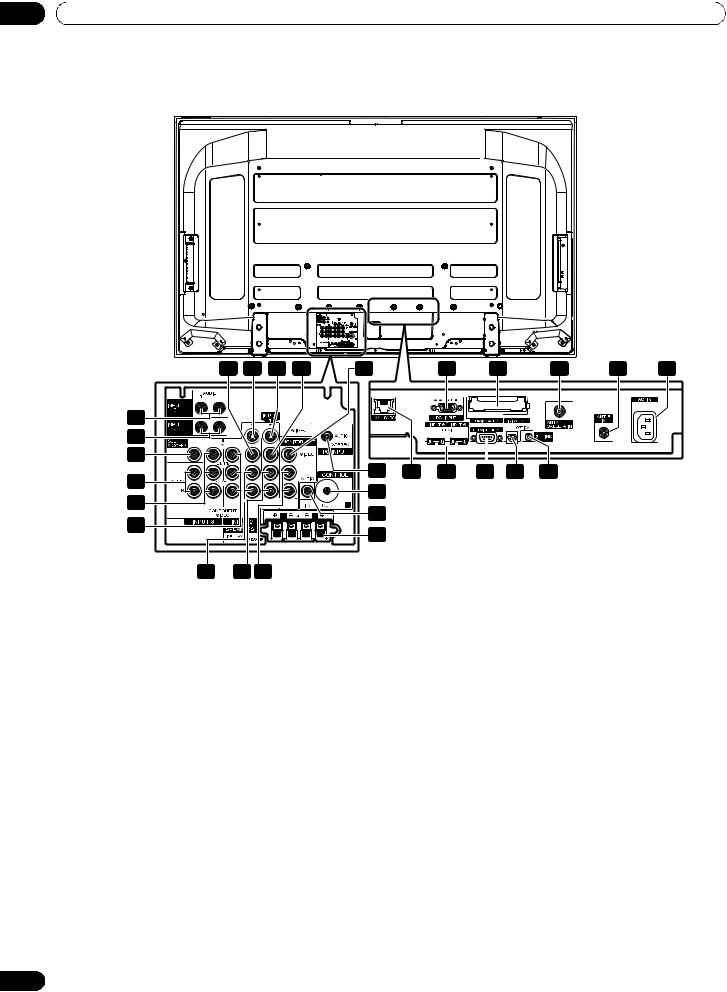
04 Part Names
Rear view (PRO-1540HD)
17 18 21 22
11 |
12 |
13 |
14 |
15 |
16 |
19 2024
23 |
1 |
2 |
3 |
4 |
5 |
25 |
6 |
|
|
|
|
10 |
|
|
|
|
|||
7 |
|
|
|
|||
8 |
9 |
|||||
26 |
|
|
(Terminals located on the upper |
|||
27 |
|
|
edge of the compartment) |
|||
28 |
|
|
|
|
|
|
1 |
PC INPUT terminal (ANALOG RGB) |
15 INPUT 3 terminals (COMPONENT VIDEO: Y, |
||
2 |
CableCARD™ slot |
|
CB/PB, CR/PR) |
|
3 |
ANT/CABLE A IN terminal |
16 INPUT 2 terminals (COMPONENT VIDEO: Y, |
||
4 |
ANT B IN terminal |
|
CB/PB, CR/PR) |
|
17 |
INPUT 2 terminal (VIDEO) |
|||
5 |
AC IN terminal |
|||
18 |
INPUT 2 terminal (S-VIDEO) |
|||
6 |
Ethernet cable port |
|||
19 |
INPUT 2 terminals (AUDIO) |
|||
7 |
HDMI terminals (INPUT 5/INPUT 6) |
|||
20 |
INPUT 1 terminals (AUDIO) |
|||
8 |
RS-232C terminal (used for factory setup) |
|||
21 |
INPUT 1 terminal (S-VIDEO) |
|||
9 |
DIGITAL OUT terminal (OPTICAL) |
|||
22 |
INPUT 1 terminal (VIDEO) |
|||
10 |
G-LINK terminal |
|||
23 |
MONITOR OUT terminal (VIDEO) |
|||
11 |
INPUT 5 terminals (AUDIO) |
|||
24 |
MONITOR OUT terminals (AUDIO) |
|||
12 |
INPUT 6 terminals (AUDIO) |
|||
25 |
PC INPUT terminal (AUDIO) |
|||
13 |
SUB WOOFER terminal |
|||
26 |
CONTROL OUT terminal |
|||
14 |
INPUT 3 terminals (AUDIO) |
|||
27 |
CONTROL IN terminal |
|||
|
|
|||
|
|
28 |
SPEAKER (R/L) terminals |
|
16
En
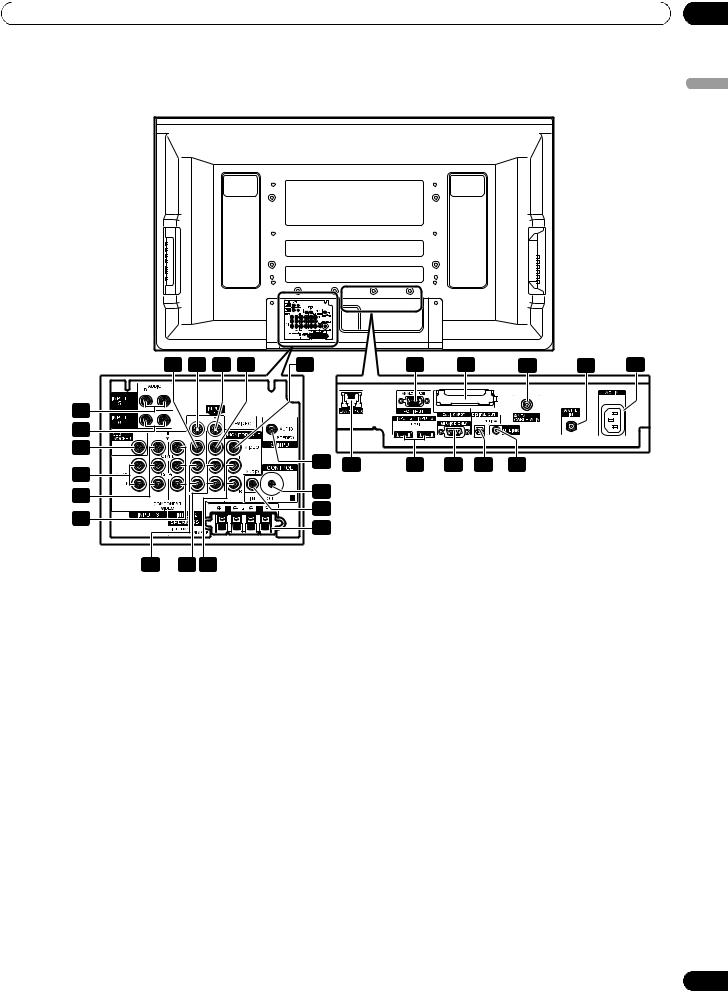
Part Names |
04 |
Rear view (PRO-1140HD)
English
17 18 21 22 |
23 |
11 |
|
|
|
12 |
|
|
|
13 |
25 |
6 |
|
14 |
|||
26 |
|
||
15 |
|
||
16 |
27 |
|
|
28 |
|
||
|
|
||
19 |
2024 |
|
1 |
2 |
3 |
4 |
5 |
7 8 9 10
(Terminals located on the upper edge of the compartment)
1 |
PC INPUT terminal (ANALOG RGB) |
15 INPUT 3 terminals (COMPONENT VIDEO: Y, |
||
2 |
CableCARD™ slot |
|
CB/PB, CR/PR) |
|
3 |
ANT/CABLE A IN terminal |
16 INPUT 2 terminals (COMPONENT VIDEO: Y, |
||
4 |
ANT B IN terminal |
|
CB/PB, CR/PR) |
|
17 |
INPUT 2 terminal (VIDEO) |
|||
5 |
AC IN terminal |
|||
18 |
INPUT 2 terminal (S-VIDEO) |
|||
6 |
Ethernet cable port |
|||
19 |
INPUT 2 terminals (AUDIO) |
|||
7 |
HDMI terminals (INPUT 5/INPUT 6) |
|||
20 |
INPUT 1 terminals (AUDIO) |
|||
8 |
RS-232C terminal (used for factory setup) |
|||
21 |
INPUT 1 terminal (S-VIDEO) |
|||
9 |
DIGITAL OUT terminal (OPTICAL) |
|||
22 |
INPUT 1 terminal (VIDEO) |
|||
10 |
G-LINK terminal |
|||
23 |
MONITOR OUT terminal (VIDEO) |
|||
11 |
INPUT 5 terminals (AUDIO) |
|||
24 |
MONITOR OUT terminals (AUDIO) |
|||
12 |
INPUT 6 terminals (AUDIO) |
|||
25 |
PC INPUT terminal (AUDIO) |
|||
13 |
SUB WOOFER terminal |
|||
26 |
CONTROL OUT terminal |
|||
14 |
INPUT 3 terminals (AUDIO) |
|||
27 |
CONTROL IN terminal |
|||
|
|
|||
|
|
28 |
SPEAKER (R/L) terminals |
|
17
En
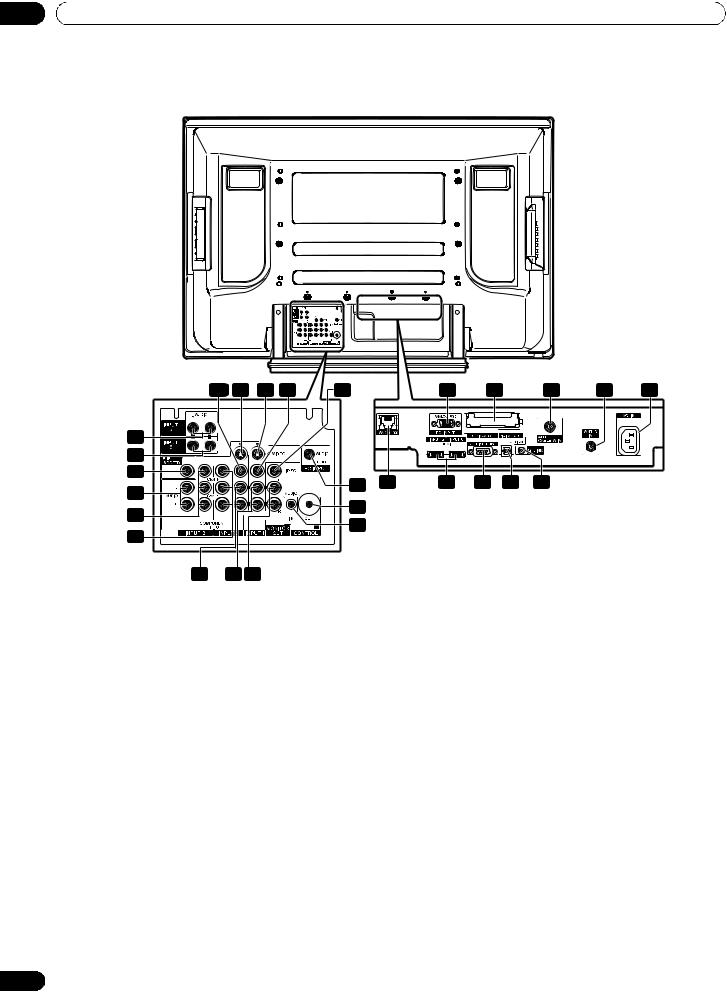
04 Part Names
Rear view (PRO-940HD)
|
17 18 21 22 |
23 |
|
11 |
|
|
|
12 |
|
|
|
13 |
|
25 |
6 |
14 |
|
||
|
26 |
|
|
15 |
|
|
|
|
27 |
|
|
16 |
|
|
|
|
|
|
|
19 |
2024 |
|
|
1 |
2 |
3 |
4 |
5 |
7 8 9 10
(Terminals located on the upper edge of the compartment)
1 |
PC INPUT terminal (ANALOG RGB) |
15 |
INPUT 3 terminals (COMPONENT VIDEO: Y, |
|
2 |
CableCARD™ slot |
|
CB/PB, CR/PR) |
|
3 |
ANT/CABLE A IN terminal |
16 |
INPUT 2 terminals (COMPONENT VIDEO: Y, |
|
4 |
ANT B IN terminal |
|
CB/PB, CR/PR) |
|
17 |
INPUT 2 terminal (VIDEO) |
|||
5 |
AC IN terminal |
|||
18 |
INPUT 2 terminal (S-VIDEO) |
|||
6 |
Ethernet cable port |
|||
19 |
INPUT 2 terminals (AUDIO) |
|||
7 |
HDMI terminals (INPUT 5/INPUT 6) |
|||
20 |
INPUT 1 terminals (AUDIO) |
|||
8 |
RS-232C terminal (used for factory setup) |
|||
21 |
INPUT 1 terminal (S-VIDEO) |
|||
9 |
DIGITAL OUT terminal (OPTICAL) |
|||
22 |
INPUT 1 terminal (VIDEO) |
|||
10 |
G-LINK terminal |
|||
23 |
MONITOR OUT terminal (VIDEO) |
|||
11 |
INPUT 5 terminals (AUDIO) |
|||
24 |
MONITOR OUT terminals (AUDIO) |
|||
12 |
INPUT 6 terminals (AUDIO) |
|||
25 |
PC INPUT terminal (AUDIO) |
|||
13 |
SUB WOOFER terminal |
|||
26 |
CONTROL OUT terminal |
|||
14 |
INPUT 3 terminals (AUDIO) |
|||
27 |
CONTROL IN terminal |
|||
|
|
18
En
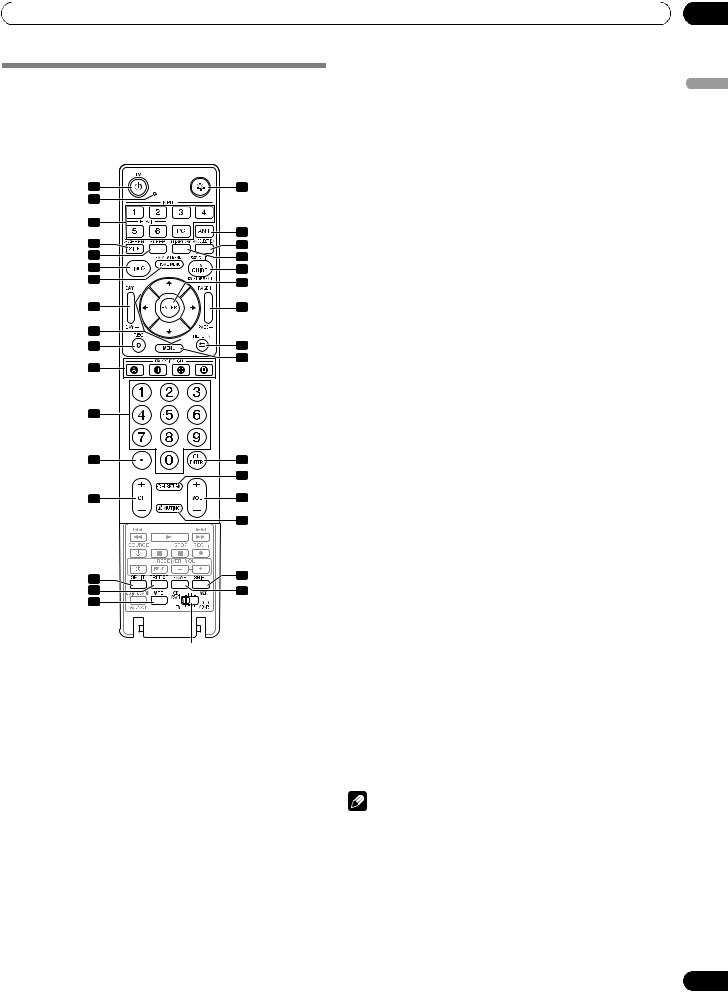
Part Names |
04 |
Remote control unit
This section describes the button functions when the mode is set to TV. To use the remote for controlling other equipment, see “Using the remote control unit to control other devices” starting on page 99.
1 |
18 |
|
2 |
|
|
3 |
19 |
|
4 |
||
20 |
||
5 |
21 |
|
6 |
22 |
|
7 |
23 |
|
|
||
8 |
24 |
|
9 |
|
|
10 |
25 |
|
11 |
26 |
|
|
||
12 |
|
|
13 |
27 |
|
|
28 |
|
14 |
29 |
|
|
30 |
|
15 |
31 |
|
|
||
16 |
32 |
|
17 |
|
|
|
Mode switch |
|
|
(with “TV” selected) |
1TV a: Turns ON the Plasma Display Panel or places it in Standby.
2Transmission confirmation LED
3INPUT: Selects an input source for the Plasma Display Panel. (INPUT 1, INPUT 2, INPUT 3, INPUT 4, INPUT 5, INPUT 6 and PC)
4SCREEN SIZE: Selects the screen size.
5SLEEP: Sets the sleep timer.
6INFO: Displays a channel banner when a TV program is being watched.
(When the TV Guide On Screen™ system is in operation, information about the currently highlighted channel appears on screen (when available).)
7HOME MENU: Displays the Home Menu screen
8DAY +/–: Jumps to the next or previous day of program listings in the TV Guide On Screen™ Listing service.
9 /
/ /
/  /
/  : Selects a desired item on the menu screen
: Selects a desired item on the menu screen
10REC: When using the TV Guide On Screen™ System, triggers recording to a connected VCR
11FAVORITE CH (A, B, C, D):
Selects any of the four preset channels (see page 43 for details to set the FAVORITE CH)
While watching, toggle the set channels by pressing A, B, C and D.
120 – 9: Selects the channel
13•(dot): Enters a dot
When entering the number of a sub-channel.
14CH +/–: Selects the channel.
15SPLIT: Switches the screen mode: 2-screen, picture- in-picture, single-screen
16FREEZE: Freezes a frame from a moving image.
Press again to cancel the function.
17MTS: Selects MTS/SAP or language depending on the program being watched
18D: Lights up all buttons
Lights turn off if no operations are performed within 5 seconds. This is used for remote control use in dark locations.
19ANT: Selects the antenna (A, B) (see page 23 for details)
20AV SELECTION: Selects audio and video settings. (AV mode: STANDARD, DYNAMIC, MOVIE, GAME, PURE, USER. PC mode: STANDARD, USER)
21DISPLAY: Displays the channel information
22TV GUIDE: Displays the TV Guide On Screen™ system
23ENTER: Executes a command
24PAGE +/– (for the TV Guide On Screen™ system):
Scrolls the program listing screen vertically.
25RETURN: Returns to the previous menu screen
26MENU: Displays a panel menu in the TV Guide On Screen™ system
27CH ENTER: Executes a channel number
28CH RETURN: Returns to the previous channel
This button is disabled while the TV Guide On Screen™ system is displayed.
29VOL +/–: Sets the volume
30M MUTING: Mutes the sound
31SHIFT: Moves the small screen to a different location when in the picture-in-picture mode
32SWAP: Switches between the two screens when in the 2-screen or picture-in-picture mode
NOTE
•When using the remote control, aim it at the Plasma Display.
•See pages 92 to 102 for buttons not listed on this page.
English
19
En
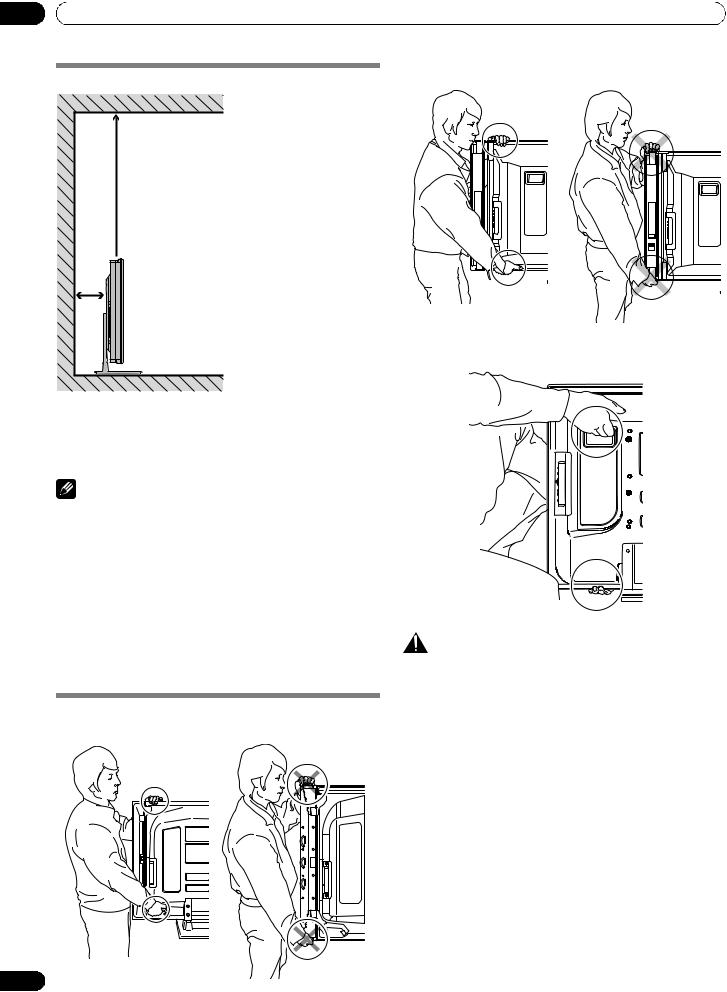
05 Preparation
(PRO-1140HD)
Installing the Plasma Display
Over 50 cm
(19 11/16 inches)
Over 10 cm  (315/16 inches)
(315/16 inches)
Location
•Avoid direct sunlight.
•Maintain adequate ventilation.
•Because the Plasma Display is heavy, have someone help you when moving or installing the panel.
NOTE
•Allow enough space around the installed Plasma Display Panel to ensure proper ventilation.
Using the optional PIONEER stand (for PRO-1540HD and PRO-1140HD)
•For details on installation, refer to the instruction manual supplied with the stand.
Using the optional PIONEER speakers (for PRO-1540HD and PRO-1140HD)
•For details on installation, refer to the instruction manual supplied with the speaker.
Moving the Plasma Display
(PRO-1540HD)
20
(PRO-940HD)
CAUTION
•These Plasma Display Panels are thin and can be unstable when held upright. Therefore, at least two people must move and install these panels.
•Do not hold by the speaker.
•Install the panel on a flat, stable location to avoid warping the glass components.
•When installing on a rack, etc., someone must steady the panel at all times.
En
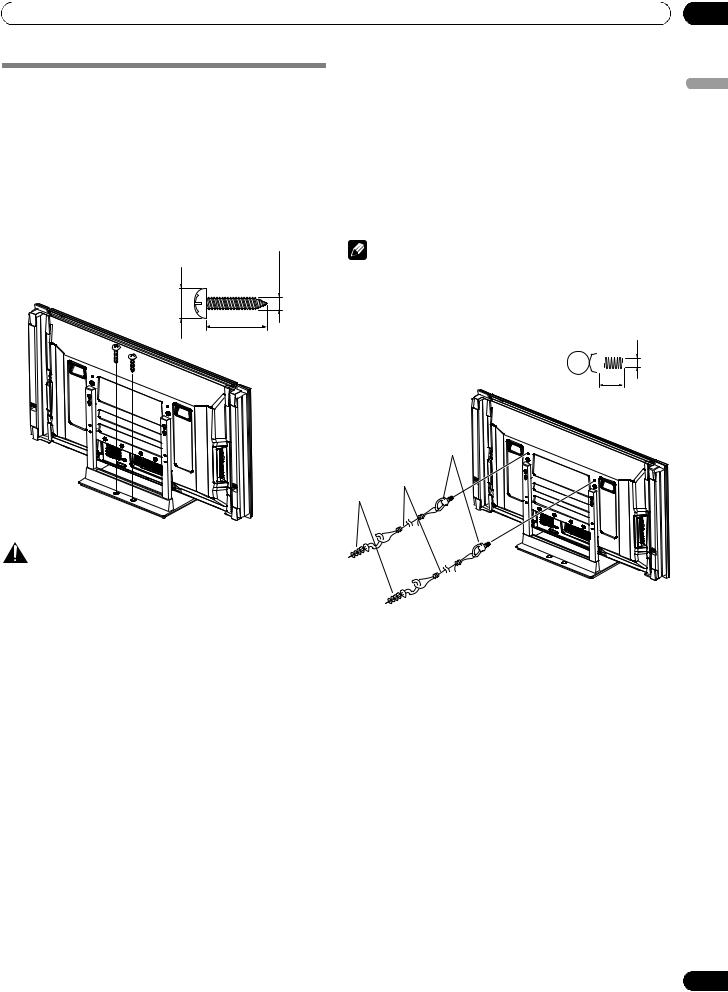
Preparation |
05 |
Preventing the Plasma Display from Falling Over
During installation, someone must steady the panel at all times.
Stabilizing on a table or floor
Stabilize the Plasma Display as shown in the diagram using screws that are 6 mm (1/4 inch) and at least 20 mm (13/16 inch) long (available from your dealer or other hardware sources).
mm to 15 mm |
inch to 5/8 inch) |
6 mm (1/4 inch) |
9 |
(3/8 |
20 mm min. |
|
|
(13/16 inch min.)
CAUTION
The installation site should have adequate strength to support the Plasma Display. A weak installation site could result in personal injury and property damage. Please take the necessary safety measures to prevent it from falling during emergencies, such as earthquakes or construction accidents. If you do not take these precautions, the Plasma Display could fall, causing injury or property damage.
Screws, hooks, chains, and other fittings used to secure the Plasma Display vary according to the composition and thickness of the surface to which the panel is attached. Inspect the mounting surface carefully to determine its thickness and composition; consult a professional installer if necessary.
Using a wall for stabilization
1.Attach fall-prevention bolts (hooks) to the Plasma Display.
2.Use strong cords to firmly attach the panel to a wall, pillar, or other sturdy construction.
3.Repeat attachment for the other side of the panel.
NOTE
Use hooks, cords, and fittings that are available from your dealer or other hardware sources.
Recommended hook: Nominal diameter 8 mm (3/8 inch) Length 12 mm to 15 mm (1/2 inch to 5/8 inch)
 M8
M8
12 mm to 15 mm (1/2 inch to 5/8 inch)
Hook
Cord
Fitting
English
21
En
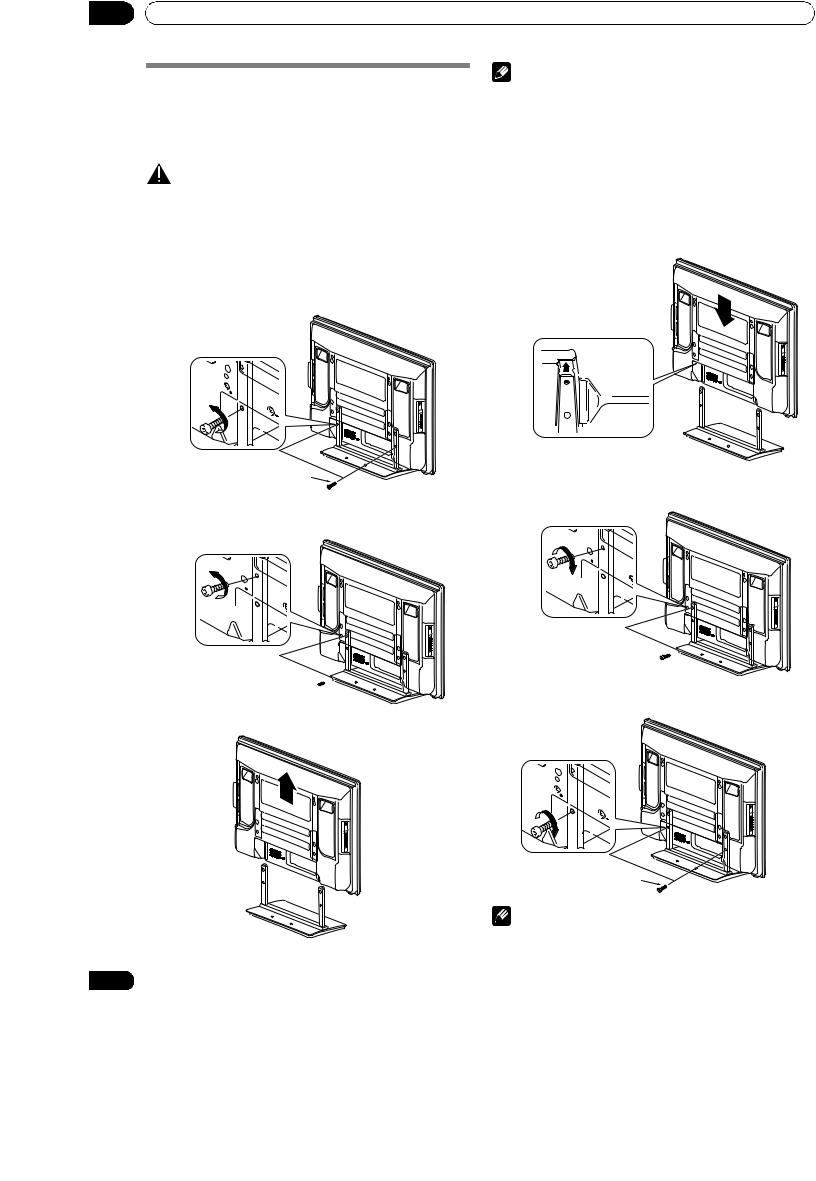
05
22
Preparation
Attaching/detaching the PIONEER stand (for PRO-940HD only)
The PRO-940HD comes with the PIONEER table top stand attached. You can mount the display in a rack by detaching the stand. The method for attaching/detaching the stand varies depending on the particular panel.
CAUTION
•If mounting the panel on a stand, use only the attached stand for this model. Other stand models are not authorized for this panel.
•Two or more people are required to assemble and install this unit.
Detaching the stand
1Loosen the two installation bolts using the enclosed hexagonal wrench.
Installation bolts (M8 x 30 mm: silver)
2Remove the two installation bolts using the same hexagonal wrench.
Installation bolts 
 (M8 x 60 mm: silver)
(M8 x 60 mm: silver) 

3 Lift the Plasma Display from the stand.
•Keep the installation bolts and for reattaching the stand to the Plasma Display at a later date.
NOTE
•Install the panel on a flat, stable location to avoid warping the glass components.
Reattaching the stand
1Fit the stand’s support columns under the Plasma Display shown below. Slowly ease the panel down on the supports.
•Be extremely careful not to insert the stand supports into any part of the Plasma Display other than the stand insertion slots. If the panel is mounted improperly, the communication ports could be damaged or the stand could be warped.
Line up the column supports with the bottom of the Plasma Display .
2Bolt the Plasma Display to the stand at the points indicated by the arrows.
Installation bolts 
 (M8 x 60 mm: silver)
(M8 x 60 mm: silver)
3Tighten the installation bolts firmly using the enclosed hexagonal wrench.
Installation bolts (M8 x 30 mm: silver)
NOTE
•Install the panel on a flat, stable location to avoid warping the glass components.
•Insert the screws in the holes vertically.
•Do not tighten them with more force than necessary.
En
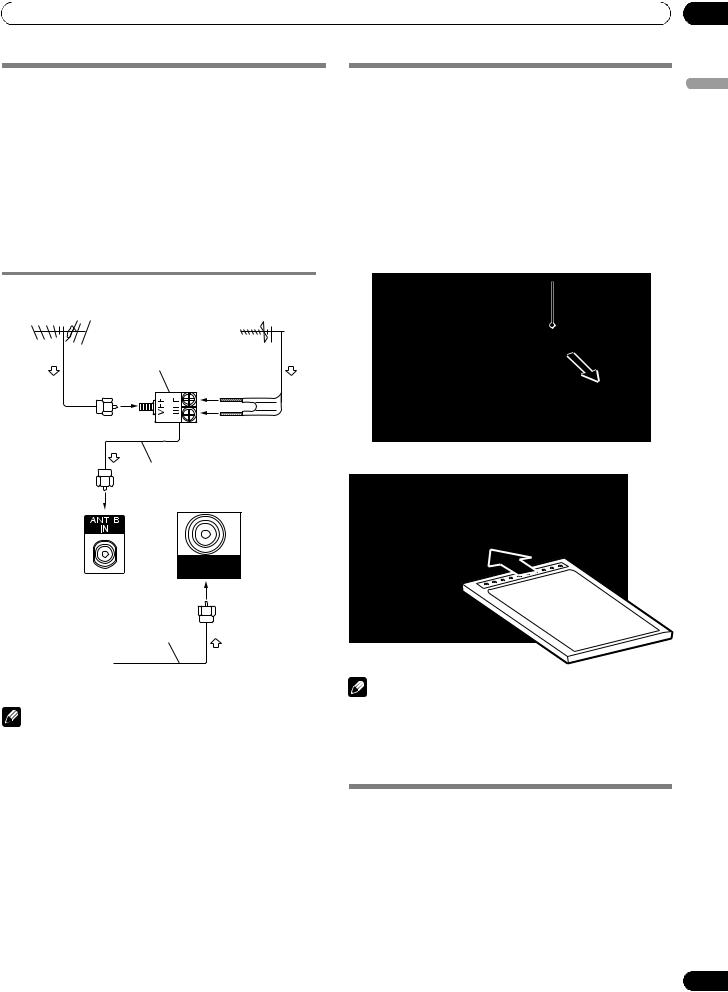
Preparation |
05 |
Cable connections for watching digital and/or conventional TV channels
This system is equipped with two terminals for inputting TV broadcasting signals, ANT/CABLE A IN and ANT B IN. The ANT/CABLE A IN terminal accepts both digital and conventional TV broadcasting signals while the ANT B IN terminal accepts only conventional TV broadcasting signals. When using cable TV to watch digital and/or conventional TV channels, connect to the ANT/CABLE A IN terminal as shown. To add an outdoor antenna for clearer pictures, connect an antenna to the ANT B IN terminal. If your outdoor antenna uses a 75-ohm coaxial cable with an F-type connector, plug it into the antenna terminal at the rear of the Plasma Display.
Connecting VHF/UHF antennas and a Cable
VHF antenna |
UHF antenna |
U/Vmixer
Inserting the CableCARD™
The Plasma Display provides a slot for inserting a CableCARD™. When you are watching digital and/or High Definition TV channels over cable, the card allows you to use the cable company’s Point of Deployment (POD) service. This service presents various types of useful information in Internetstyled text.
1Confirm that the ANT/CABLE A IN terminal is connected to the Cable Converter box using a coaxial cable.
2Slide the slot cover tab on the rear of the Plasma Display to the left then remove the cover while pulling the tab’s latch down.
(Viewed from below of the Tab
Plasma Display)
1
2
English
3 Insert the specified CableCARD™ completely into the slot.
Coaxial
ANT/
CABLE A IN
Plasma Display (rear)
Coaxial
Cable TV
NOTE
•Connect coaxial cables as shown above. Signal reception may fail if cables are connected improperly.
•In order to watch cable TV channels, be sure to connect the cable to the ANT/CABLE A IN terminal.
•The ANT/CABLE A IN and ANT B IN terminals must not receive the same signals. For example, do not connect the cable TV line to both the ANT/CABLE A IN and ANT B IN terminals. Similarly, do not connect an antenna cable to both the ANT/CABLE A IN and ANT B IN terminals.
•The TV Guide On Screen™ system may not be available in all areas and is not available with satellite systems. In addition, as content providers move to digital programming and broadcasting, TV Guide data may be unavailable or become unavailable.
NOTE
•Be sure to insert only the specified CableCARD™.
•Do not insert a PC card.
•The CableCARD™ automatically generates a cable channel list. It is unnecessary to activate the “Auto Channel Preset” option.
Switching between antenna A and B
To watch broadcasts via the two antennas, press ANT on the remote control.
•While watching a broadcast, press ANT to view the feed from the other antenna.
•While watching in the 2-screen mode (TV image and video image) with TV selected, press ANT to view the feed from the other antenna.
•Pressing ANT while watching in the 2-screen mode with two TV images displayed has no effect.
23
En
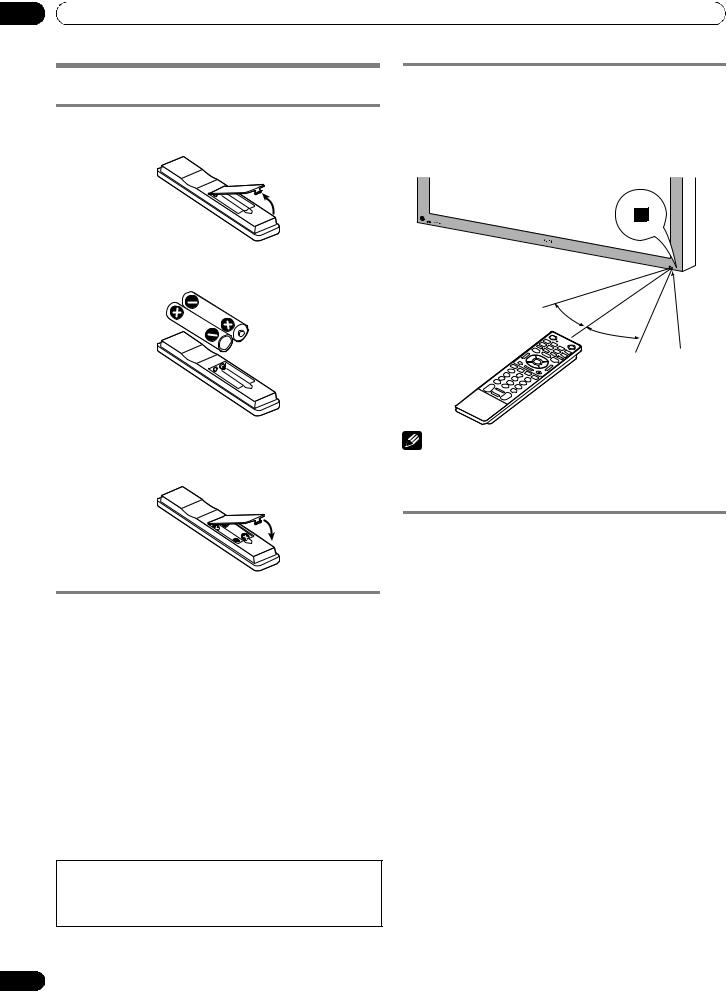
05 Preparation
Preparing the remote control unit
Inserting batteries
1 Open the battery cover.
2Load the supplied two AA batteries. Insert the negative polarity (–) ends first.
•The battery polarities must correspond with the (+) and
(–) indicators in the battery compartment.
3 Close the battery cover.
Cautions regarding batteries
•The remote control unit cannot operate the system if the batteries in the unit are weak. When this happens, replace the batteries with new ones.
•Use alkaline batteries rather than manganese batteries.
•Do not mix battery brands. Different brands have different characteristics.
•Do not mix old and new batteries. Mixing old and new batteries can shorten the life of new batteries or cause chemical leakage in old batteries.
•Do not leave dead batteries in the remote control. Dead batteries leak chemicals. If you find any chemical leakage, wipe thoroughly with a clean cloth.
•The batteries supplied with this product may have a shorter life expectancy due to storage conditions.
•If you will not use the remote control unit for an extended period of time, remove the batteries.
Battery disposal
When disposing of used batteries, please comply with governmental regulations or environmental public institution’s rules that apply in your country/area.
24
Allowed operation range of the remote control unit
To use the remote control, point it at the sensor located at the bottom right corner of the Plasma Display. The distance from the remote control sensor must be within 7 m (23 feet) and the angle relative to the sensor must be within 30 degrees left or right.
|
7 m |
30º |
(23 feet) |
30º
Remote control sensor
NOTE
•Although the SR logo also appears in the lower right corner on the PRO-940HD, the sensor is in the same location for all three panels.
Cautions regarding the remote control unit
•Do not expose the remote control to shock, liquid, or high humidity.
•Do not place the remote control unit under direct sunlight, the unit may deform.
•The remote control may not work properly if the panel’s remote sensor window is under direct sunlight or strong room lighting. If the remote control fails to function in a bright environment, try changing the signal angle or move closer to the panel.
•Objects placed between the remote control and the panel sensor may block the signal.
•As the batteries become weak, the remote control may need to be used closer to the panel. Replace the batteries with new ones if necessary.
•The Plasma Display emits very weak infrared rays from its screen. Other nearby equipment using an infrared remote control such as a VCR may receive scrambled or incomplete commands from its remote control. In this situation, move the equipment away from the Plasma Display.
•Depending on the environment, infrared rays from the Plasma Display may corrupt signals sent by the remote control. These IR waves could also require that the remote control be used closer to the panel. The strength of infrared rays emitted from the screen differs, depending on the image being displayed.
En
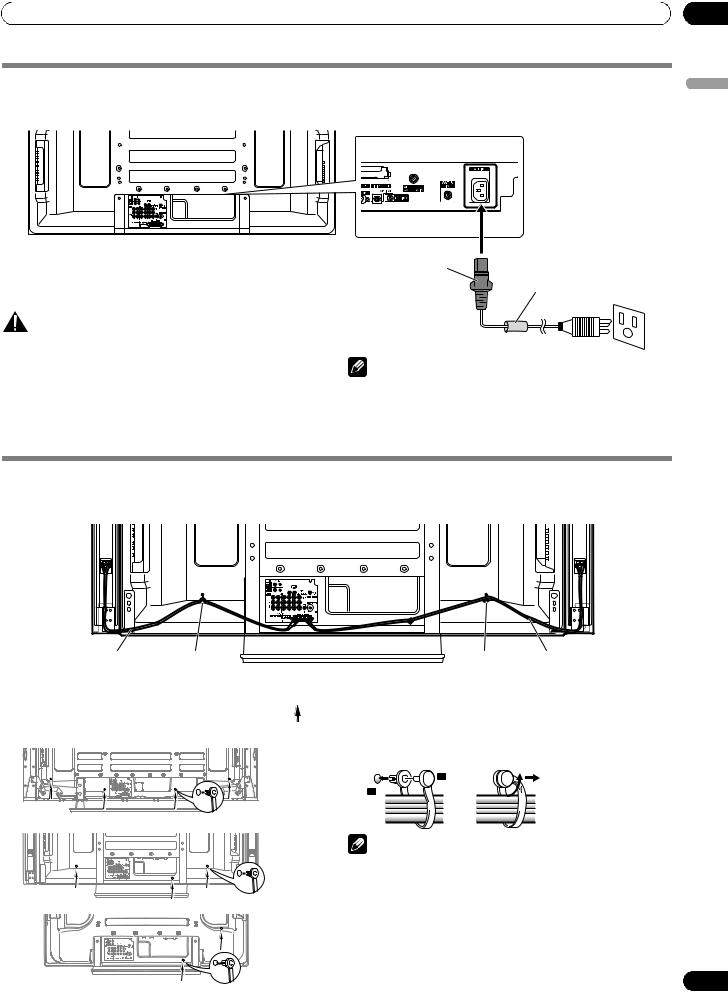
Preparation |
05 |
Connecting the power cord
Connect the power cord last, after all other components are connected.
Plasma Display (rear view)
Power cord
AC IN terminal is located on the upper edge of the compartment.
Noise filter
Partially eliminates noise caused by the power source.
CAUTION
•Use only the supplied power cord.
•Use only the specified power supply voltage; neglecting this can result in fire or electric shock.
•For the Plasma Display System, a three-core power cord with a ground terminal is used for safety reasons. Always connect the power cord to a three-pronged outlet and make sure that the cord is properly grounded.
NOTE
•Always turn the panel’s power OFF when connecting or disconnecting power cords.
•Disconnect the power cord from the wall outlet when the Plasma Display Panel is not going to be used for a long period of time.
English
Routing cables
When the speakers are installed on the sides Rear view
Speaker cable Speed clamp
Attaching speed clamps to the main unit
Attach the speed clamps using any of the 4 holes you prefer
(50 inches, 3 holes: 42 inches, 2 holes) marked with an arrow ( ) below, depending on your routing system.
for PRO-1540HD
for PRO-1140HD
for PRO-940HD
Speed clamp |
Speaker cable |
Attaching and removing speed clamps
Insert [1] into an appropriate hole on the rear of the Plasma Display then snap [2] into the back of [1] to lock the clamp. Speed clamps are designed to be difficult to release once in place. Please attach them carefully.
Use pliers to twist the clamp 90º, pulling outward. The clamp may deteriorate over time and become damaged if removed.
2
1
NOTE
•Use the supplied speed clamps as necessary.
•Bundle speaker cables so that none are pinched.
25
En
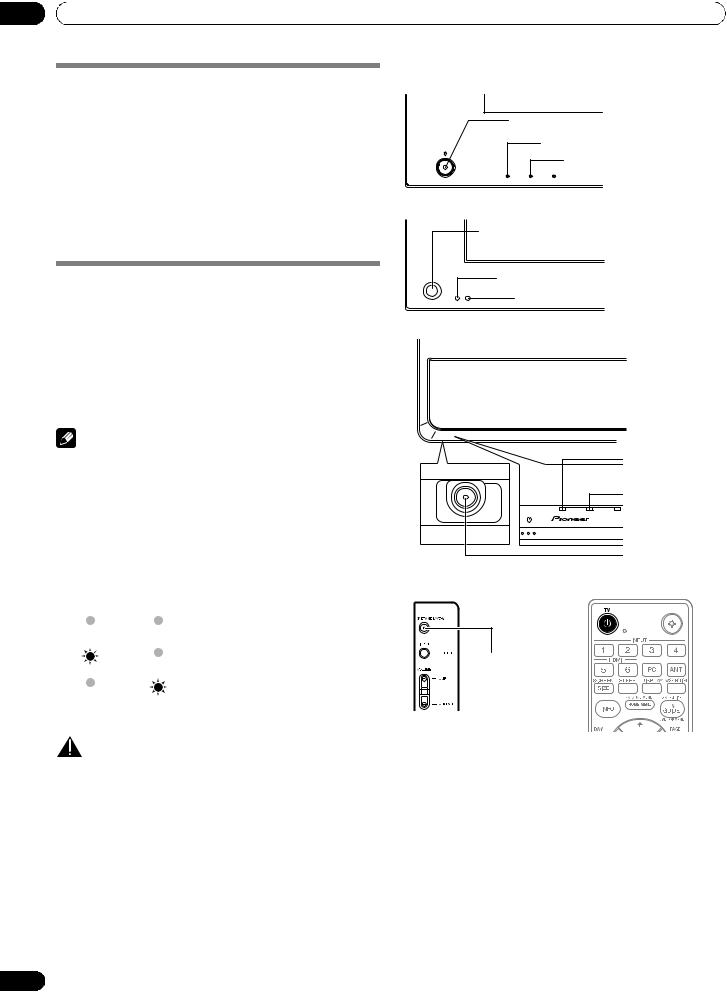
06 Basic Operations
Turning on the power
(from Standby)
1Press aPOWER on the Plasma Display if the POWER ON and STANDBY indicators are off.
•The STANDBY indicator on the Plasma Display lights up red.
2Press TV a on the remote control unit or STANDBY/ON on the Plasma Display to turn the system on.
•The POWER ON indicator on the Plasma Display lights up blue.
Turning off the power
(to Standby)
1Press TV a on the remote control unit or STANDBY/ON on the Plasma Display.
•The system enters the standby mode and the image on the screen disappears.
•The STANDBY indicator lights up red.
•This allows the system to automatically receive digital TV program information while in Standby.
NOTE
•If you are not going to use this system for a long period of time, unplug the power cord from the power outlet.
Plasma Display status indicators
The table below shows the operational status of the Plasma Display Panel. Panel indicators reflect the current status of the Plasma Display.
Indicator |
|
System Status |
Status |
|
|
|
|
|
|
|
|
POWER ON |
STANDBY |
|
|
|
|
|
|
The Plasma Display has been unplugged |
|
|
or the Plasma Display is off. |
|
|
|
|
|
Power to the system is on. |
|
|
|
|
|
The system is in Standby. |
|
|
|
For other than the above, see “Troubleshooting”on page 103.
CAUTION
•If the POWER ON and STANDBY indicators are off, the system cannot be powered ON. Pressing the TV a or STANDBY/ON button has no effect. Press POWER then wait for the Standby indicator to light (red).
•The Plasma Display System consumes some power as long as the plug is inserted into an outlet.
26
Plasma Display
(PRO-1540HD)
POWER button
POWER ON indicator
STANDBY indicator
(PRO-1140HD)
POWER button
POWER ON indicator
STANDBY indicator
(PRO-940HD)
POWER ON indicator
STANDBY
indicator
POWER button
Viewed from below of the display (left).
STANDBY/ON button
(Right side view)
En
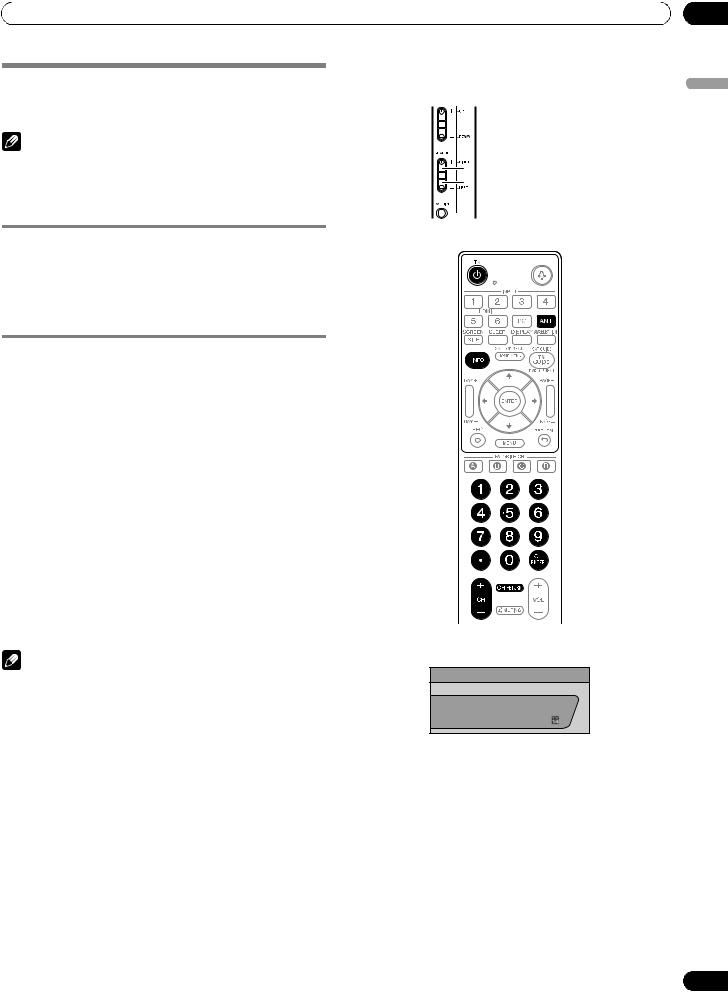
Basic Operations
Watching TV channels
TV channels must be programmed into your panel. Refer to “Setting up TV channels” on page 37.
NOTE
•When watching a digital TV program, you may see emergency alert messages scrolling at the top of the screen. Those messages are broadcasted by TV stations as necessary when in emergency situations.
Selecting the antenna
After confirming that the Mode switch on the remote control has been set to “TV”, press ANT on the remote control unit to select antenna A or B.
•This selection depends on the connections to the panel’s antenna input terminals (page 23).
Changing channels
To increase the channel number, press CH + on the remote control. To decrease the channel number, press CH –.
•CHANNEL +/– on the Plasma Display operates the same as CH +/– on the remote control.
•Press CH RETURN to switch back to the previous channel. Press CH RETURN again to return to the current channel.
Using 0 – 9 and • (dot) on the remote control unit
Press any combination of buttons 0 to 9 to select a specific channel. To select subchannels, use the • (dot) button.
EXAMPLE
•To select channel 5 (1-digit channel), press 5.
•To select channel 25 (2-digit channel), press 2 then 5.
•To select channel 125 (3-digit channel), press 1, 2, then 5.
•To select subchannel 10.01, press 1, 0, • (dot), 0, then 1.
•To select subchannel 10.001 (for cable TV), press 1, 0,
• (dot), 0, 0, then 1.
NOTE
•After entering a channel or subchannel number, press CH ENTER to tune in the channel more quickly.
•Each time you change a channel, a channel banner appears
that shows information about the currently selected channel. To clear the channel banner, press INFO.
•If you do not activate the TV Guide On Screen™ system, the channel banner may not display certain types of program information.
06
Plasma Display (right side view)
English
 CHANNEL +/–
CHANNEL +/–
Channel banner
12:33pm |
|
DTV 2 • 1002.102 A |
|
XXXXXXXXXX |
|
12:30pm — 2:00pm |
XXX |
27
En
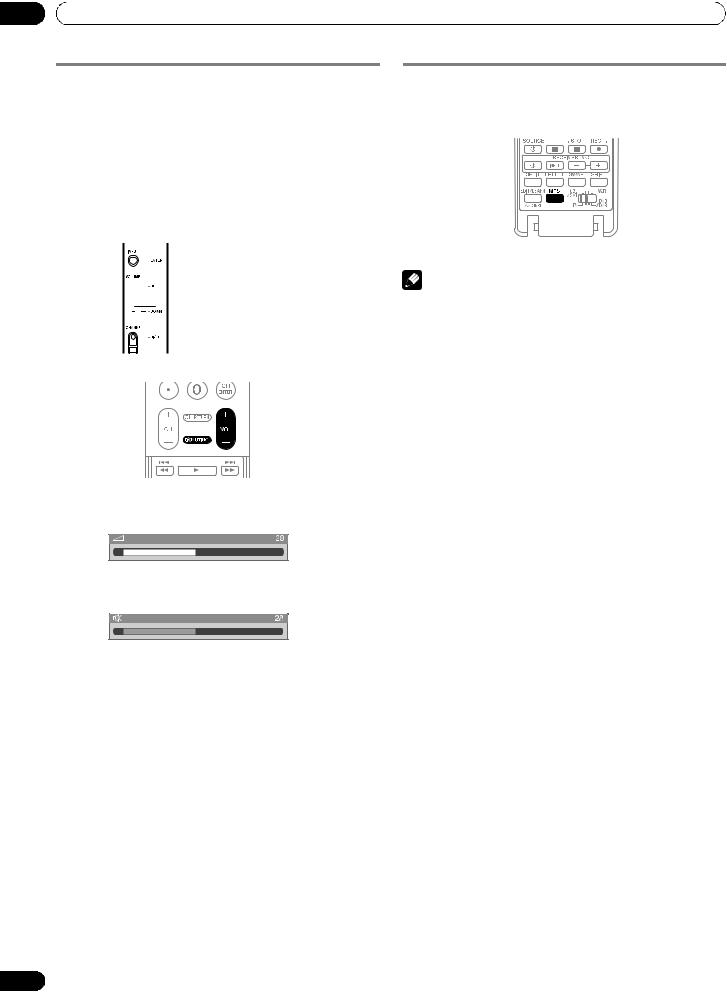
06
28
Basic Operations
Changing the volume and sound
To increase the volume, press VOL + on the remote control. To decrease the volume, press VOL –.
•VOLUME +/– on the Plasma Display operates the same as VOL +/– on the remote control.
•To mute the sound output, press MUTING. The symbol “ ” appears on the screen. To return to the previous volume, press MUTING again. Pressing VOL + also quits muting.
” appears on the screen. To return to the previous volume, press MUTING again. Pressing VOL + also quits muting.
Plasma Display (right side view)

 VOLUME +/–
VOLUME +/–
Volume adjustment display
Muting display
Changing the language
If you have selected a digital TV program that provides multilanguage services, switch among the languages by pressing MTS on the remote control.
Each time you press MTS, the language switches.
NOTE
•Switchable languages differ depending on the broadcast.
•If the language selected through language setting is available when the channel or program is changed, you hear that language.
•If you are watching a digital TV program without sound or without language information, “N/A” appears on the screen. If a language other than English, French, or Spanish is selected, “Others” appears on the screen.
En
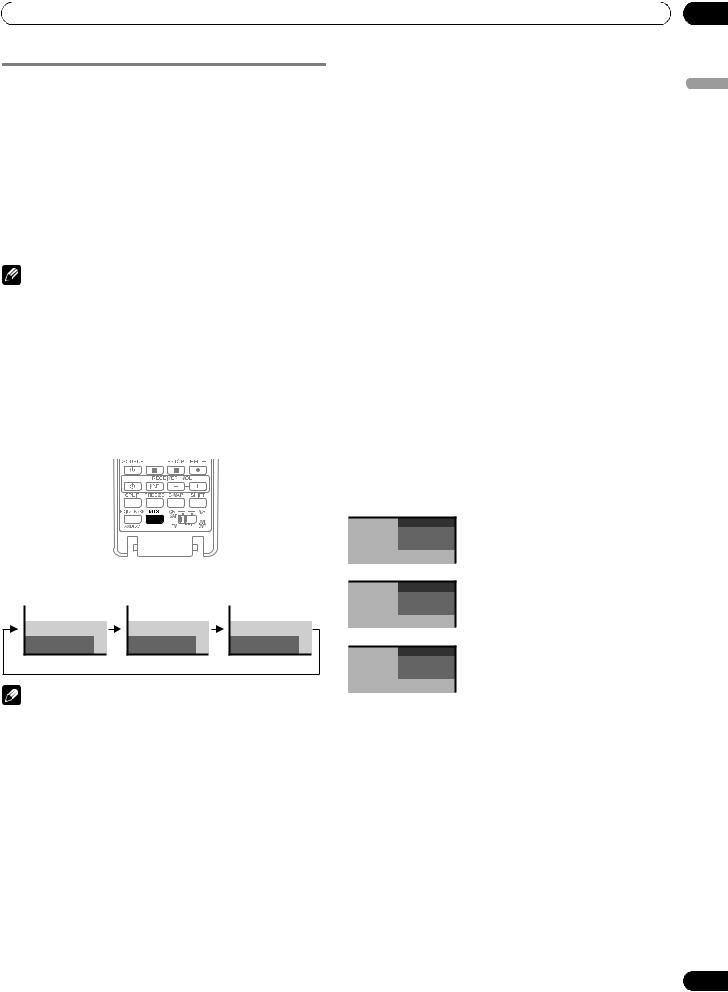
Basic Operations
Setting MTS/SAP mode
When watching conventional TV programs, use the Multichannel Television Sound (MTS) function to enjoy stereo sound and/or Secondary Audio Programs (SAP).
•Stereo broadcasts
Sports, shows, and concerts can be shown with dynamic stereo sound.
•SAP broadcasts
MAIN sound: The normal program soundtrack (either in mono or stereo).
SAP sound: Listen to a second language, supplementary commentary and other information. (SAP is mono sound.)
NOTE
•Conventional TV channels: TV channels received through the conventional VHF/UHF frequencies or conventional cable TV channels
•When stereo sound is difficult to hear, manually switch to MONO for clearer sound.
•Once MONO is selected, the Plasma Display sound remains mono even if the system receives a stereo broadcast. You must reselect STEREO to hear stereo sound again.
•Selecting MTS while the source is from an INPUT (1 to 6) or a PC does not change the type of sound. The video source determines the type of sound.
When receiving STEREO sound signals
|
A 125 |
|
|
STEREO |
In STEREO mode |
|
|
|
|
|
|
|
|
|
|
A 125 |
|
|
STEREO |
In SAP mode |
|
|
|
|
|
|
|
|
|
|
A 125 |
|
|
MONO |
In MONO mode |
|
|
|
|
|
|
When receiving MONO + SAP sound signals
|
A 125 |
|
|
MONO (SAP) |
In STEREO mode |
|
|
|
|
|
|
|
|
|
|
A 125 |
|
|
SAP (MAIN) |
In SAP mode |
|
|
|
|
|
|
|
|
|
|
A 125 |
|
|
MONO (SAP) |
In MONO mode |
|
|
|
|
|
|
When receiving STEREO + SAP sound signals
A 125
STEREO (SAP) In STEREO mode
Press MTS to cycle through the types of sound.
STEREO mode |
SAP mode |
A 125 |
|
MONO mode |
|
||
|
|
SAP (STEREO) |
In SAP mode |
STEREO |
SAP |
MONO |
|
|
|
A 125 |
|
|
|
MONO (SAP) |
In MONO mode |
NOTE
• The MTS button is disabled while the TV Guide On Screen™ |
When receiving MONO sound signals |
||
system is displayed. |
|
|
|
• In each of the sound types, the display changes according to |
|
A 125 |
|
|
MONO |
In STEREO mode |
|
the broadcast signals. |
|
||
|
|
||
|
|
|
|
|
|
|
|
|
|
A 125 |
|
|
|
MAIN |
In SAP mode |
|
|
|
|
|
|
|
|
|
|
|
|
|
|
A 125 |
|
|
|
MONO |
In MONO mode |
|
|
|
|
|
|
|
|
06
English
29
En
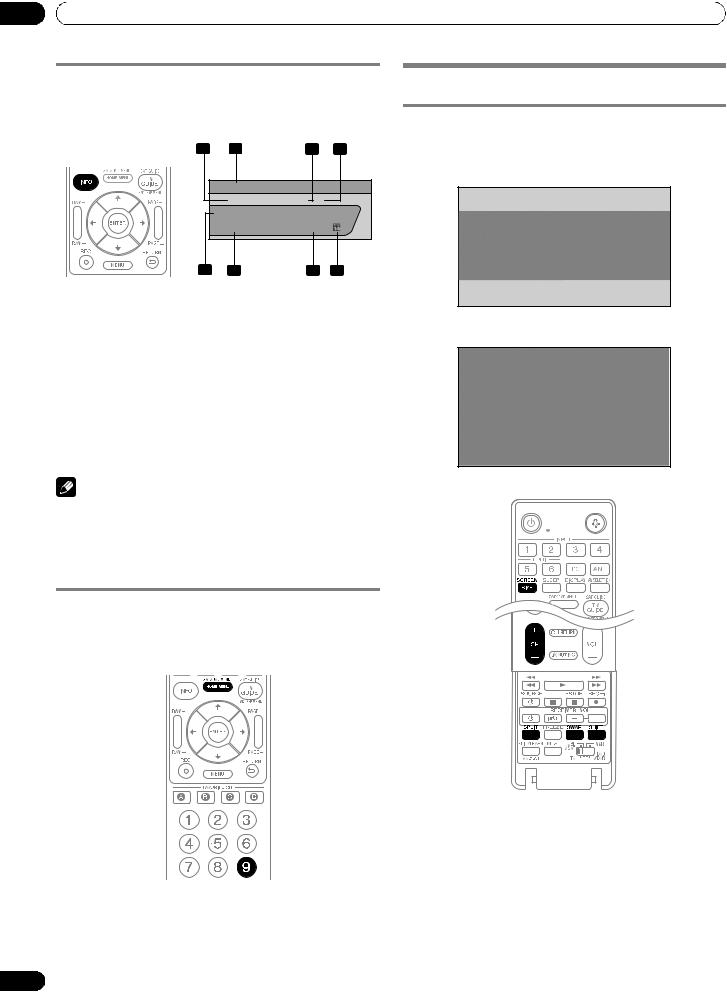
06 Basic Operations
Viewing a channel banner
While watching a TV program, pressing INFO causes a banner to appear. Pressing INFO again causes the banner to disappear.
1 |
2 |
3 |
4 |
12:33pm |
|
DTV 2 • 1002.102 A |
|
XXXXXXXXXX |
|
12:30pm — 2:00pm |
XXX |
5 |
6 |
7 |
8 |
1Station name
2Current time
3Channel number
4Input (Ant. A or Ant. B)
5Program title
6Program time schedule
7Channel logo
8TV rating name or icon
NOTE
•The above information is not displayed unless included in broadcast signals.
•If you do not activate the TV Guide On Screen™ system, the channel banner may not display certain types of program information.
Using the POD service
If you watch digital and/or High Definition TV channels over cable, you can use the POD service provided by the cable TV company. This service presents various types of useful information, using Internet-style text.
Using the multiscreen functions
Splitting the screen
Use the following procedure to select the 2-screen or picture- in-picture mode.
2-screen
Picture-in-picture
1 Press SPLIT to select the display mode.
• Press SPLIT to cycle through the display options: 2- screen, picture-in-picture, and single-screen.
Press HOME MENU, 9, 9, then 9 to view the POD display.
30
En
